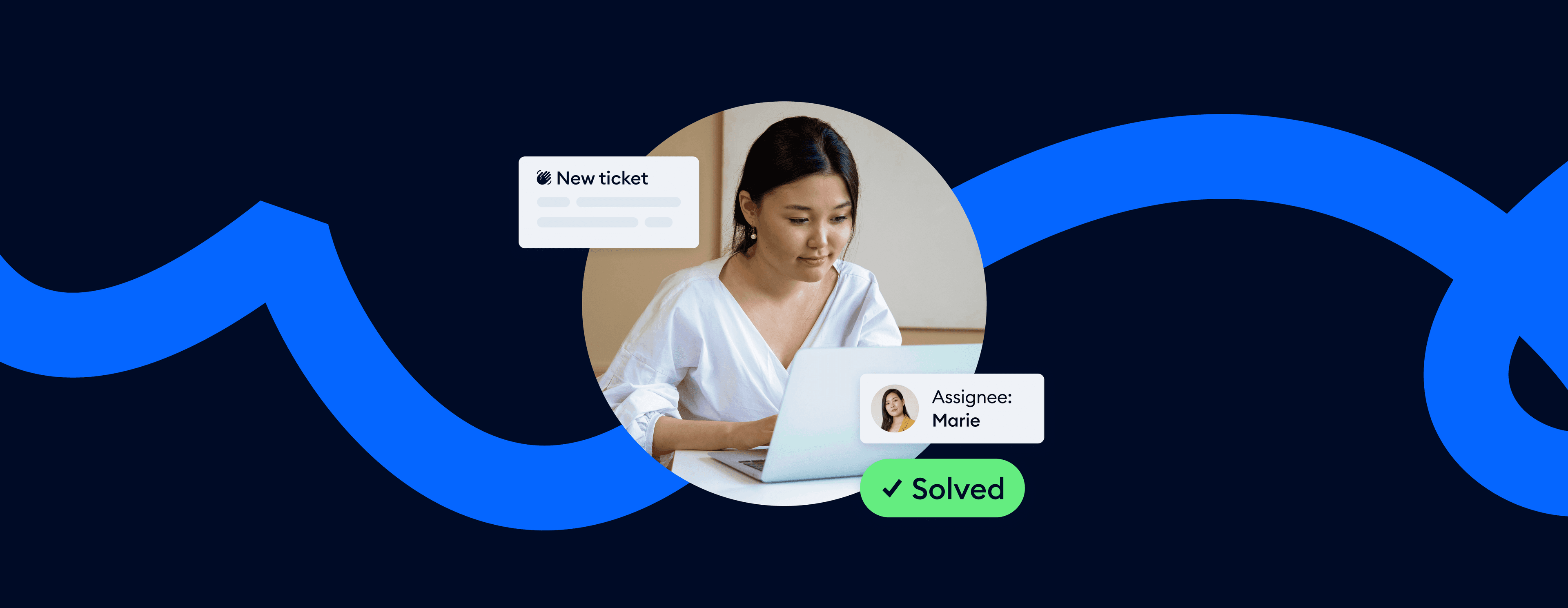Help desk ticketing system makes communication with the business easier for customers. It also helps the support teams to stay organized and answer queries more efficiently.
However, picking the right software can be difficult.
You need to think about the features that suit your needs best in order for your teams to get the most out of the system. This helps them to successfully continue to scale your business.
So—
What is the best help desk ticketing system for your business?
We’ll help you figure this out.
In this article:
- What is a ticketing system and how it works
- The ultimate ticketing system software list
- The features you should look out for
- 5 benefits of using ticket management solutions
- Best practices for a help desk ticketing software
- How to implement the system to your website
- How to streamline operations using a ticketing system
- How to choose the right one for your business
Tag your customers, assign operators, and reply in minutes
Ticketing systems are not what you were looking for? Check these articles instead:
- 13 Best Marketing Automation Software & Tools
- 35 Sales Tools for Sales Representatives & Marketers
- What Is Customer Service Automation? [Full Guide]
First things first—
What is a ticketing system?
A help desk ticketing system is software used by a customer support team to create and manage client requests and issues. Listing them as “tickets” in an organized system makes it easier to manage, organize, and solve the inquiries.
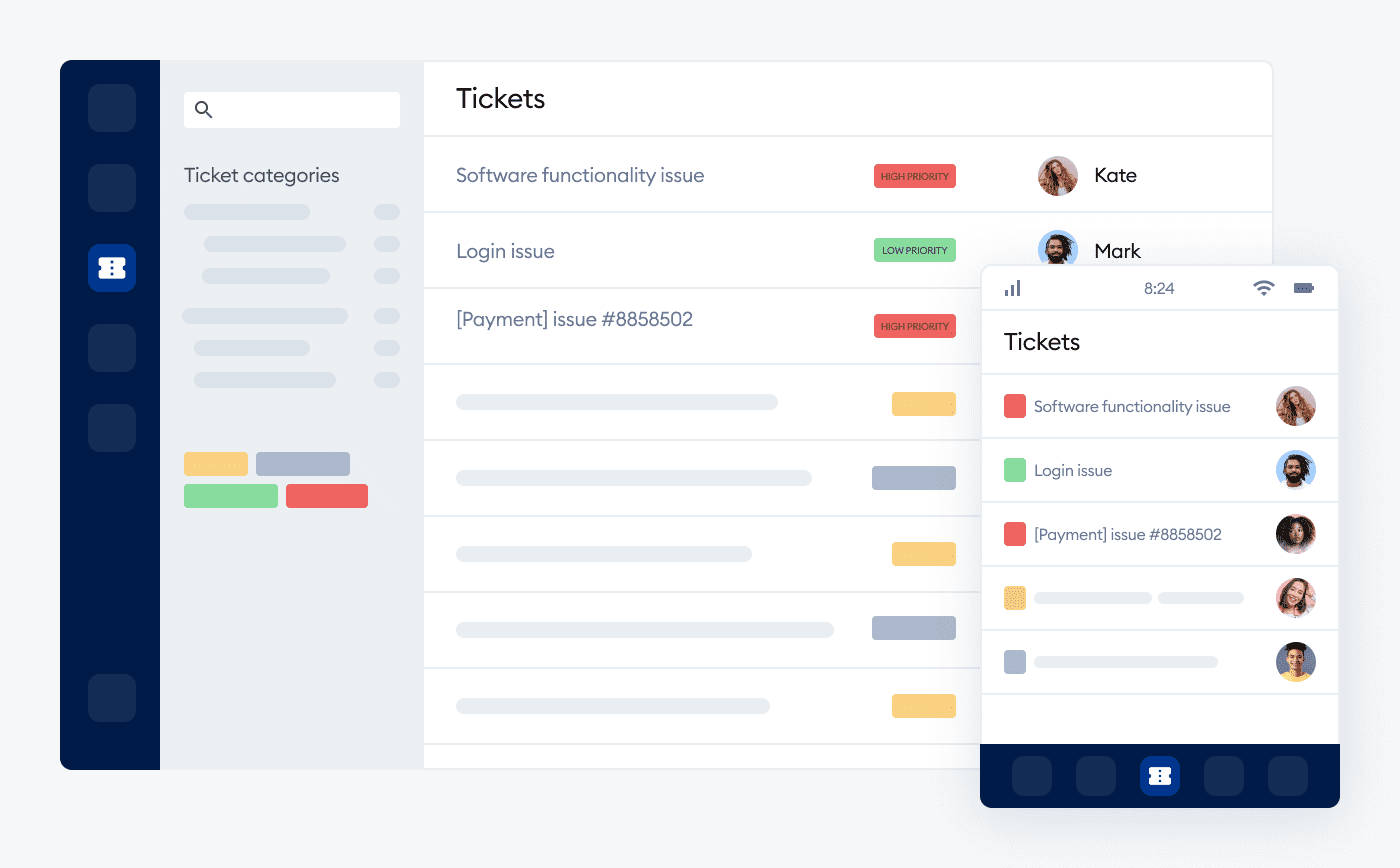
Helpdesk ticketing systems usually provide the ticketing feature as a solid base. On top of that, they include an array of other features such as live chat, multichannel ticketing, advanced analytics, and a knowledge base. There are many types of ticketing systems—some are designed to serve email ticketing only, and others are best used in B2B environments.
Did you know that…
A “helpdesk ticketing system” and an “IT ticketing system” are often used interchangeably but they are not the same software. An IT helpdesk ticketing system is an issue-tracking system that provides support for the internal processes of the company. Some solutions offer both systems as a package.
In our article, we focus mainly on help desk ticketing systems that deal with customer requests.
But before we get to the top platforms, let’s first look at—
How do online ticketing systems work?
Ticketing systems translate end users’ issues and requests into tickets. These tickets, coming from different channels (might be email, live chat, or even social media) are then visible in the ticketing system as a list of tasks for customer support teams to resolve.
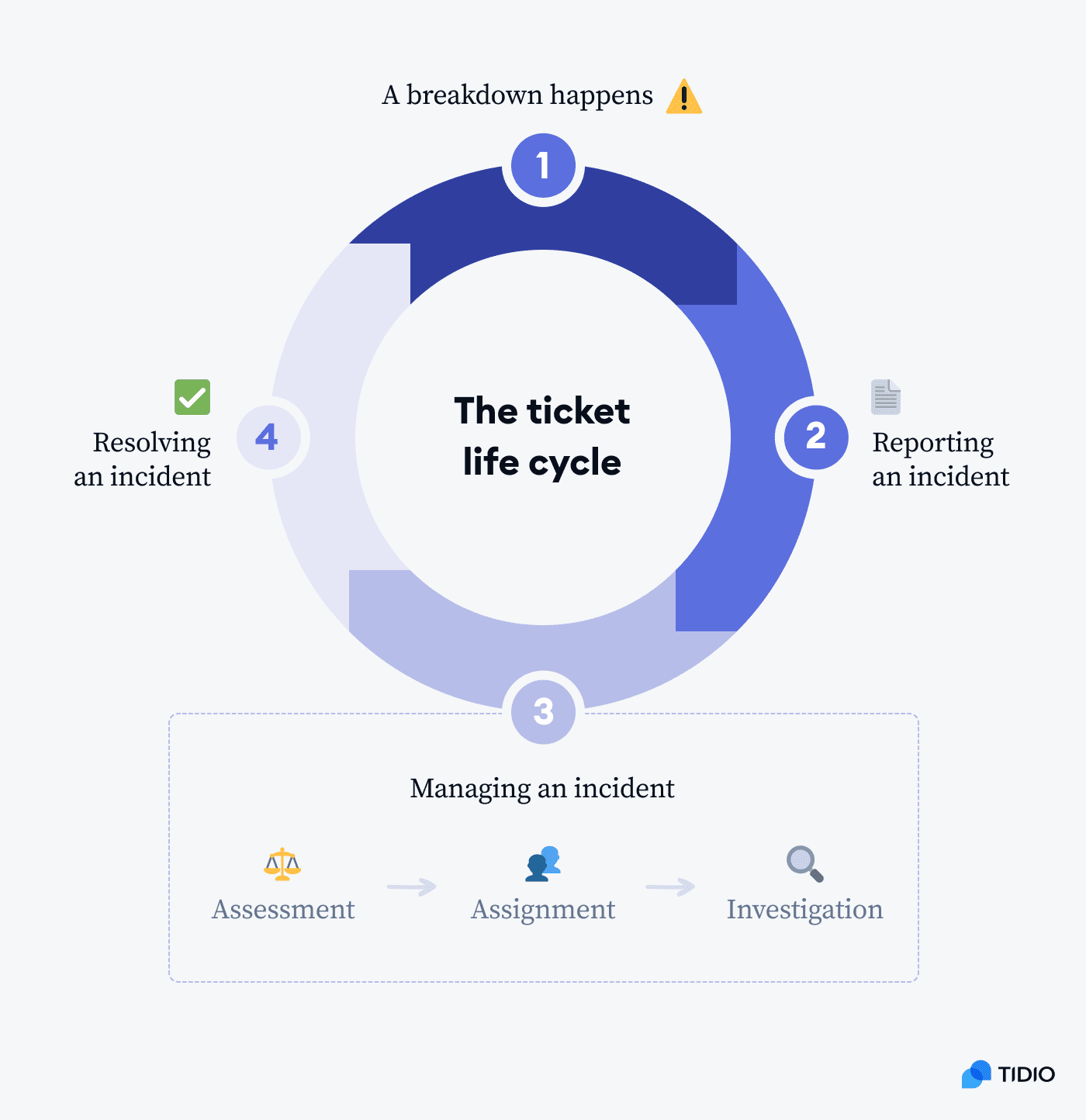
Each ticket records data about the process of resolution: customer interactions, internal conversations between CS team members, and attempted and/or accepted resolutions. This data, when tracked and reported, can be then transformed into an analytics goldmine, full of valuable insights about the business’s productivity.
Now for the main reason why you came to this article. Let’s go through the best help desk ticketing systems available on the market. We hand-picked the 20 best solutions, so you will surely find the one that fits your needs.
Top help desk ticketing software
Here’s the full list of the best ticketing tools we cover. You can jump right into the specific review by clicking on the platform. If you wish to learn more about ticketing platforms themselves and the benefits of using them, make sure to scroll down.
| Platform | Rating | Free version | Best for |
|---|---|---|---|
| Tidio | 4.7/5 ⭐️ | ✅ | AI-powered chatbots in the package |
| Zendesk | 4.3/5 ⭐️ | ❌ | 1,000+ integrations |
| HubSpot | 4.4/5 ⭐️ | ✅ | Unified customer service solution |
| Zoho Desk | 4.4/5 ⭐️ | ✅ | Integrations with Slack, Jira, Salesforce, Google |
| Mojo IT | 4.4/5 ⭐️ | ❌ | Advanced analytics |
| Freshdesk | 4.4/5 ⭐️ | ❌ | Ticket merging |
| HappyFox | 4.5/5 ⭐️ | ❌ | Multiple ticket views |
| osTicket | 4.5/5 ⭐️ | ✅ | Customizable views |
| Help Scout | 4.4/5 ⭐️ | ❌ | Robust API |
| Jira Service Management | 4.2/5 ⭐️ | ✅ | Request queues |
| Live Agent | 4.5/5 ⭐️ | ✅ | Multichannel support |
| Jitbit | 4.2/5 ⭐️ | ❌ | Cloud and on-premise versions, mobile apps |
| WordPress Advanced Ticketing System | 4/5 ⭐️ | ✅ | Email ticket transfer |
| KB Support | 4.6/5 ⭐️ | ❌ | Zapier and WooCommerce integrations |
| Vision Helpdesk | 4.7/5 ⭐️ | ❌ | Agent achievements features |
| Front | 4.6/5 ⭐️ | ❌ | Shared draft tools |
| Azure Desk | 4.6/5 ⭐️ | ❌ | Unlimited email addresses |
| ProProfs Help Desk | 4.4/5 ⭐️ | ✅ | Even ticket distribution |
| SupportBee | 4.2/5 ⭐️ | ❌ | Multiple branding options |
| Kayako | 4.1/5 ⭐️ | ❌ | Customer Journey Single View™ |
Let’s review this software one by one in detail.
1. Tidio
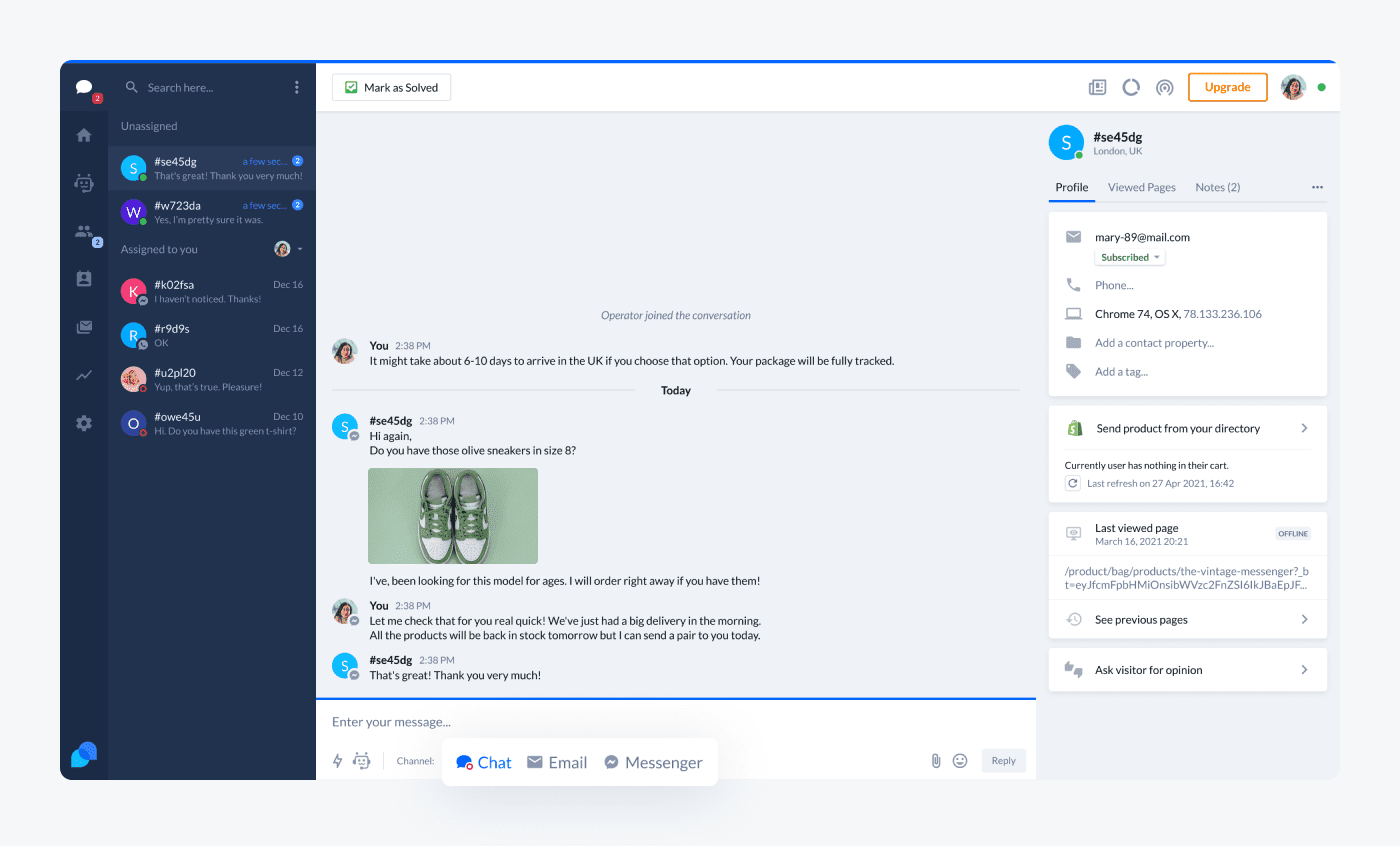
Ratings: 4.7/5⭐️ (1,410+ reviews)
Tidio is an all-in-one customer service platform for SMBs and ecommerce businesses. It offers a simple dashboard with multichannel support, so you can manage conversations from multiple communication channels in a single inbox. On top of that, you can easily segment your visitors, tag them, use chatbots for FAQs, and notify your agents of complex queries.
Main features:
- Multichannel support (live chat, email, social media)
- Simple, intuitive user interface
- Visitor list segmentation and tagging system
- Custom notifications for agents and departments
- AI chatbots with NLP
- Free
- Email marketing ($10/mo)
- Starter ($29/mo)
- Automation ($29/mo)
- Growth ($59/mo)
- Lyro AI ($39/mo)
- Tidio + (starting from $499/mo)
Have a look into the platform:
Read more: See how to efficiently manage multiple projects at Tidio. Check out the top Front alternatives and choose the best one for your business.
2. Zendesk ticketing system
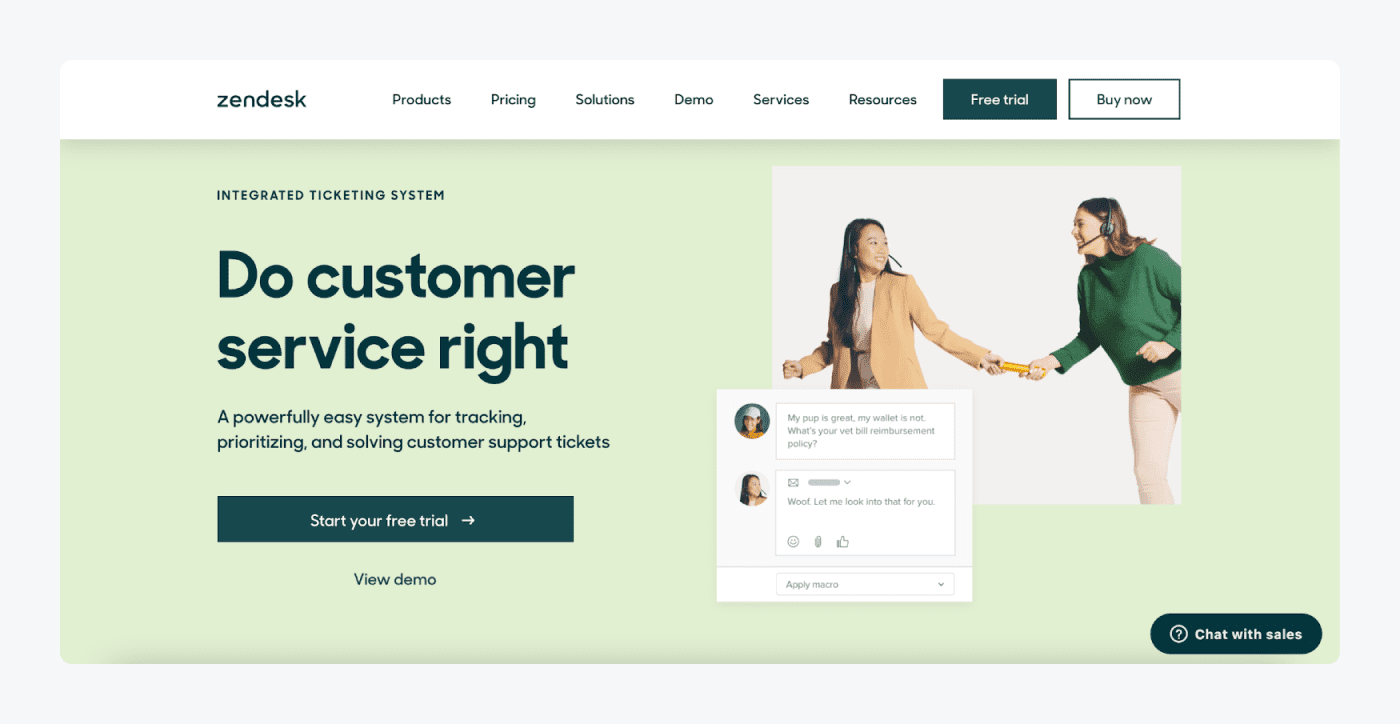
Ratings: 4.3/5⭐️ (5,750+ reviews)
Zendesk is a robust help desk software offering multichannel support. It acts as the backbone of your customer service operations, offering additional live chat and chatbot features. On top of that, it easily integrates with a variety of apps.
Pros:
- Over 1,000 integrations
- Built-in issue tracking system
- Self-service knowledge base
Cons:
- Too many email notifications
- Complex system can be overwhelming
- 14-day free trial
- Suite Team ($69/mo/agent)
- Suite Growth ($115t/mo/agent)
- Suite Professional ($149/mo/agent)
- Suite Enterprise → contact sales team
Have a look into the platform:
Read more: Discover how to make a chatbot for your website in a few easy-to-follow steps.
3. HubSpot ticketing system
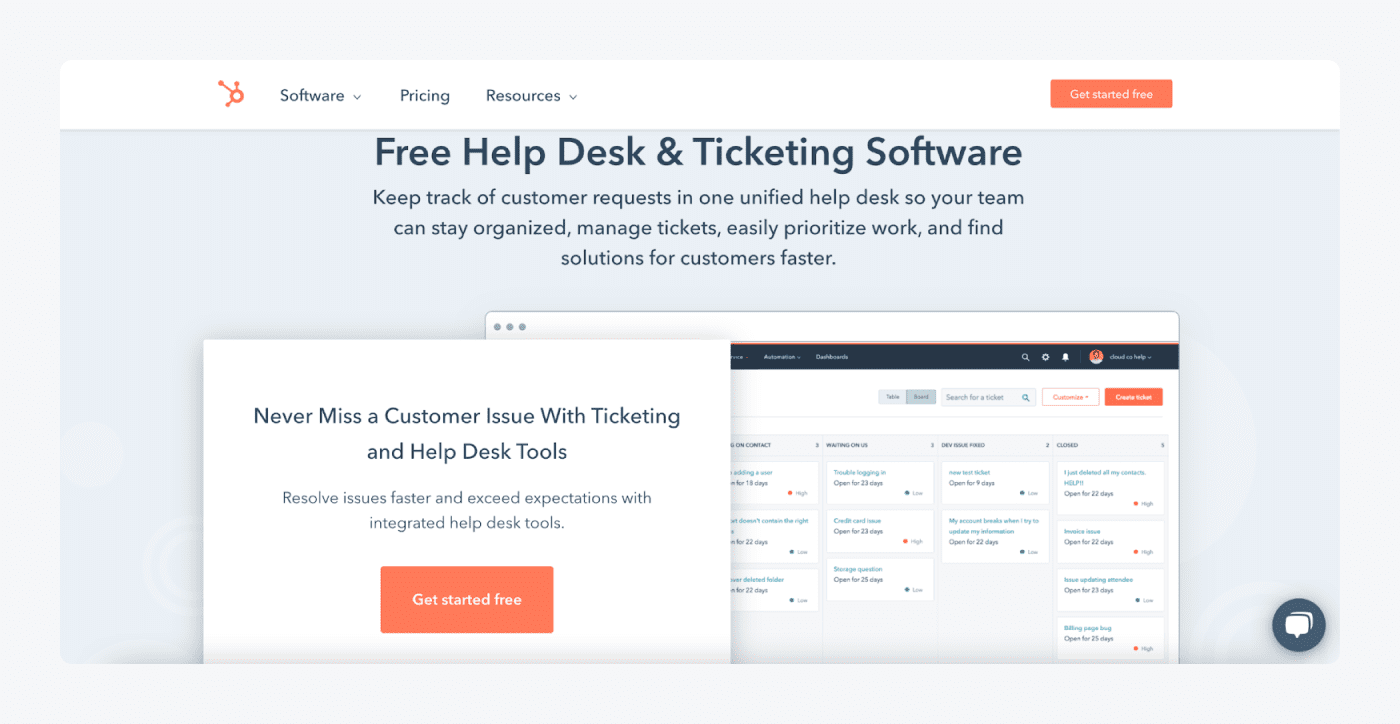
Ratings: 4.4/5⭐️ (2,060+ reviews)
HubSpot is an advanced CRM software with a ticketing system as one of its functionalities. It offers a whole customer service management hub that includes a ticketing solution and project management tools. Moreover, it allows you to easily categorize customer issues and boost your support team’s performance in real time.
Pros:
- Ticket routing and automation
- Customer satisfaction measurement
- APIs and SDKs available
Cons:
- Difficult to navigate between the message inbox and tickets
- Oldschool email reply system
- Free plan available
- Starter (Starts at $30/mo)
- Professional (Starts at $490/mo)
- Enterprise (Starts at $1,180/mo)
4. Zoho Desk
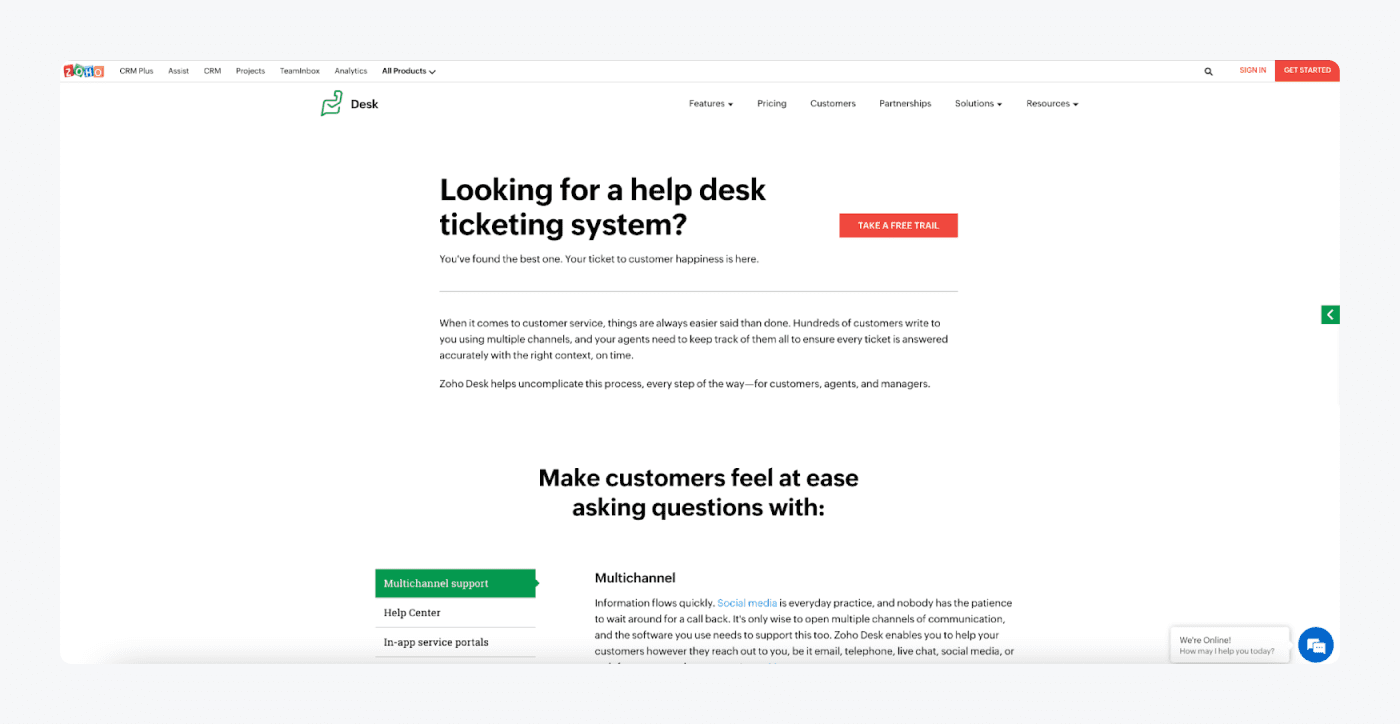
Ratings: 4.4/5⭐️ (3,200+ reviews)
Similarly to HubSpot, Zoho offers a CRM with ticketing system functionality that integrates with the majority of popular apps. It makes IT ticket management easy with an array of features such as auto-tagging, canned responses, and a time tracker.
Pros:
- Integrations with Slack, Jira, Salesforce, and Google
- Automated workflows
- Time tracker available
Cons:
- Some users complain about the email ticket notifications
- Some reports could be more visual
- Free version available
- Standard ($20/mo/user)
- Professional ($35/mo/user)
- Enterprise ($50/mo/user)
Have a look into the platform:
5. Mojo IT Helpdesk
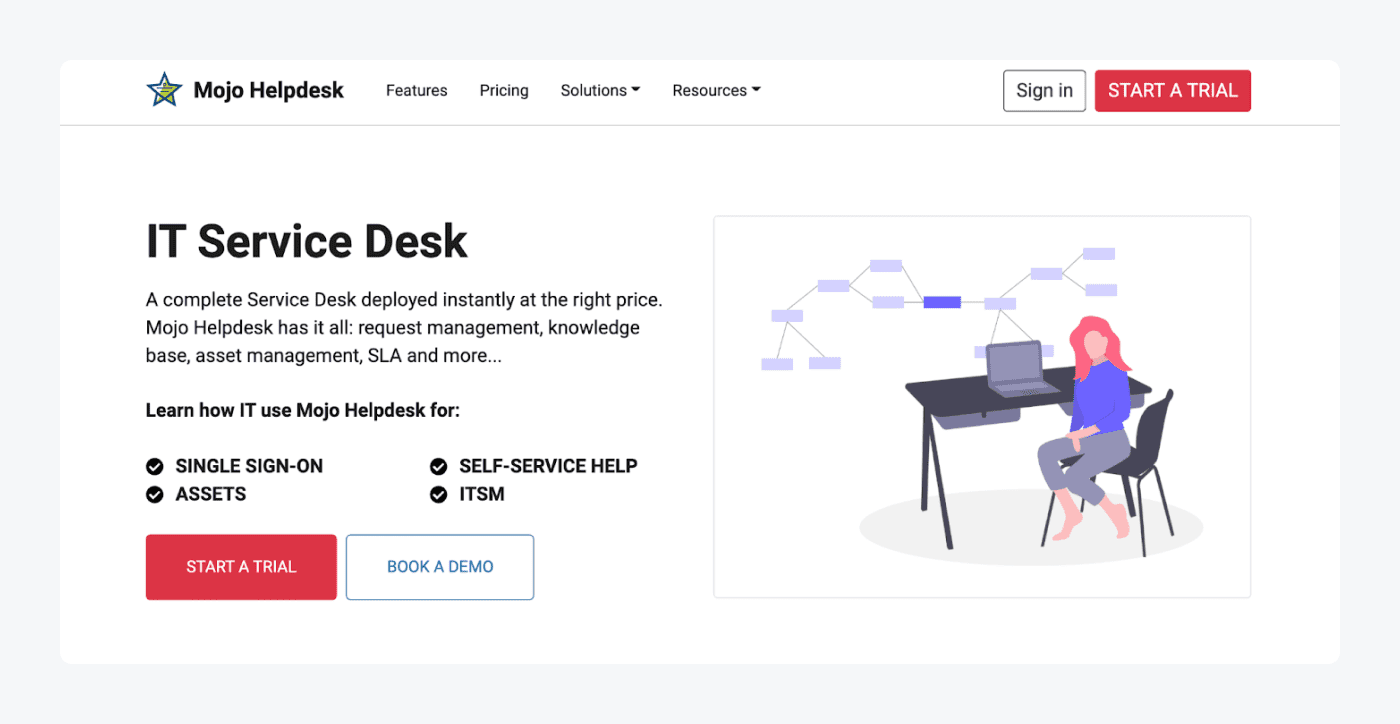
Ratings: 4.4/5⭐️ (240+ reviews)
Mojo is an IT ticketing system that integrates with G-Suite as well as Microsoft 365 with a single sign-on. Thanks to Mojo, your customers can fill support tickets from multiple channels, and you can easily sort service requests and answer them from one dashboard.
Pros:
- Asset management and tracking
- Advanced analytics and dashboards
- Self-service options
Cons:
- Confusing positions of the open tickets
- The information on the dashboard only works for 30 days
- 21-day free trial
- Team ($14/mo/agent)
- Business ($24/mo/agent)
- Enterprise ($34/mo/agent)
Have a look into the platform:
5. Freshdesk
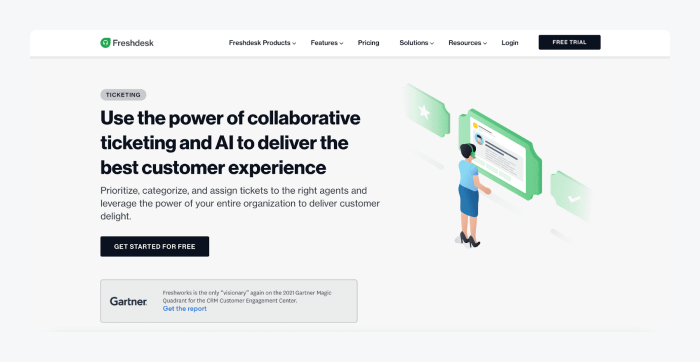
Ratings: 4.4/5⭐️(2,970+ reviews)
Freshdesk is a customer service ticketing system that encourages team collaboration. It enables your team to view, assign, and merge incoming tickets to improve organization. On top of that, the platform lets your agents see notifications about status changes for better workflow.
Pros:
- Smart notifications
- Ticket assignment and merging
- Activity logs for agents
Cons:
- Hard-to-reach support team
- User interface is difficult to navigate
- Free plan available
- Growth ($18/mo/agent)
- Pro ($59/mo/agent)
- Enterprise ($95/mo/agent)
Have a look into the platform:
Read more: Discover what bad customer service is and how to fix it.
6. HappyFox help desk ticketing system
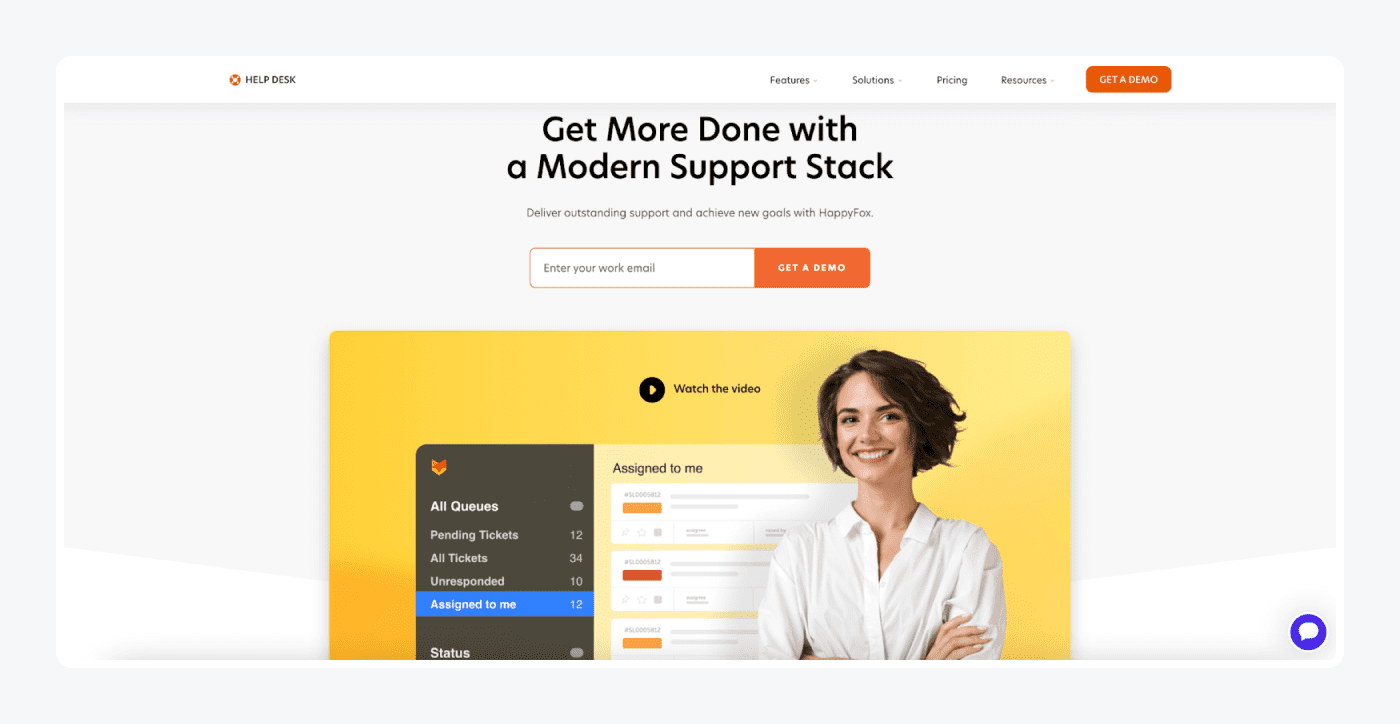
Ratings: 4.5/5⭐️ (120+ reviews)
Happyfox is an online ticketing system that encourages smart workload management. It enables agents to streamline ticket statuses with the help of various views (Kanban, lists, and cards). On top of that, end users can conveniently send support requests via email or a dedicated support center.
Pros:
- Multiple ticket views
- Advanced analytics and reporting
- Unlimited shared inboxes
Cons:
- The inputs are not customizable
- Limited onboarding material
- Mighty ($39/mo/agent)
- Fantastic ($59/mo/agent)
- Enterprise ($79/mo/agent)
- Enterprise Plus ($99/mo/agent)
Have a look into the platform:
8. osTicket free ticketing system
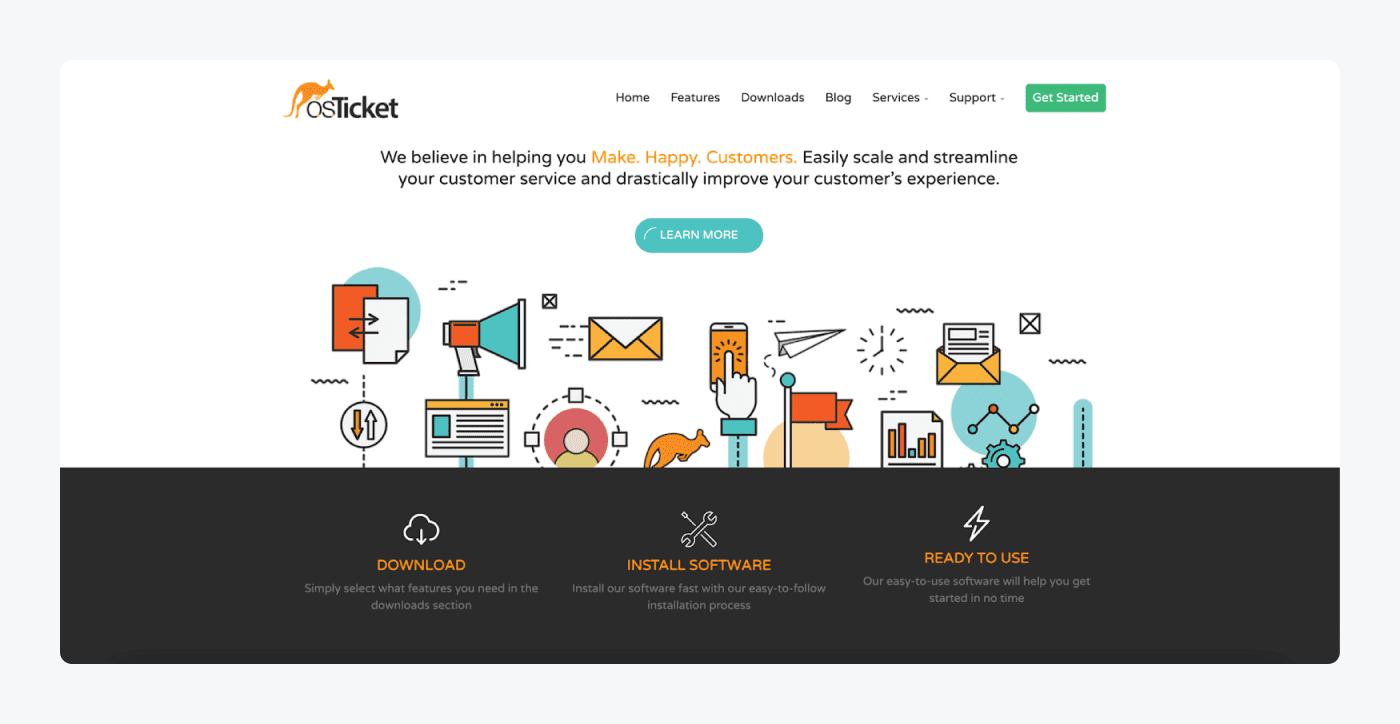
Ratings: 4.5/5⭐️(40+ reviews)
osTicket is an open-source ticket system that provides many customization options for the service portal. This means that customer requests can be sorted by custom fields and agents can create personalized views to speed up the support process.
Pros:
- Customizable views
- Ticket filtering options
- Autoresponder feature
Cons:
- Limited customization options
- People say the user interface feels old
- Free open-source plan for all users
- Cloud hosted (Starting at $12/mo/agent)
Have a look into the platform:
9. Help Scout
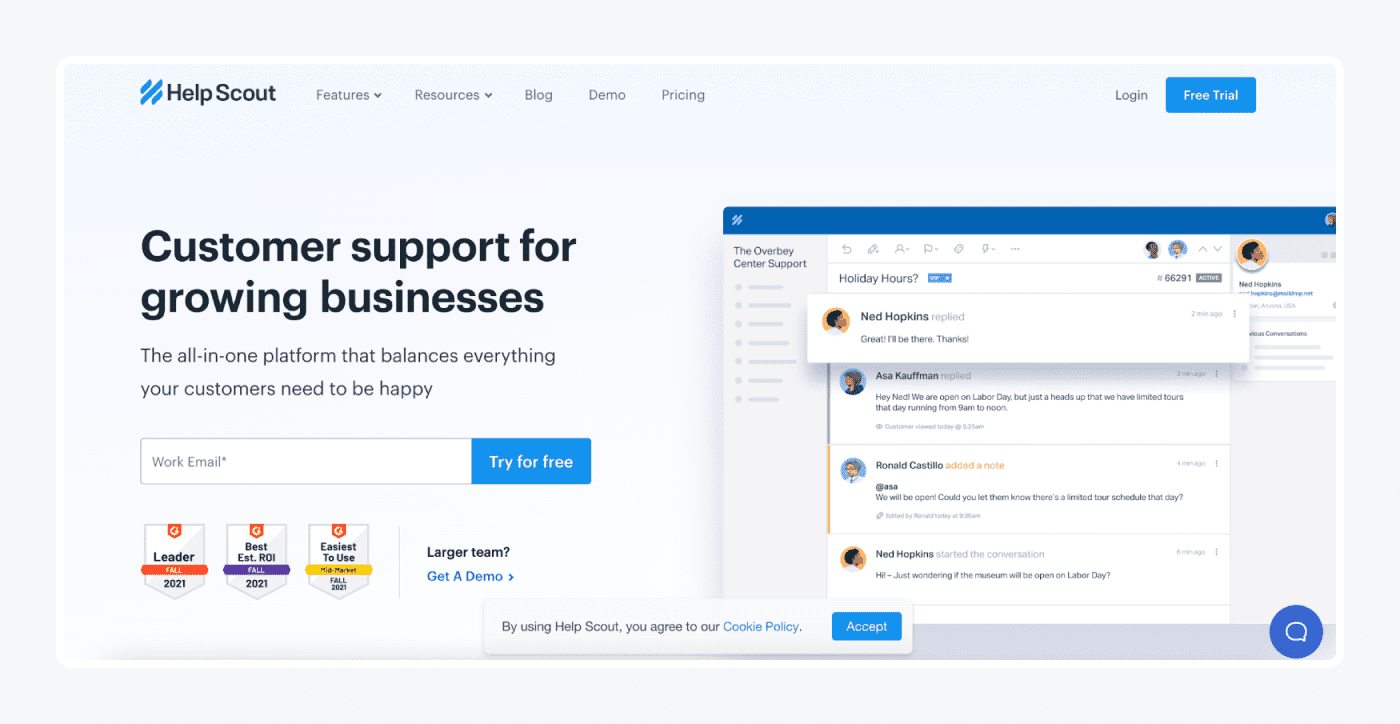
Ratings: 4.4/5⭐️(398+ reviews)
This is one of the all-in-one ticketing software systems with a robust API and a variety of extensions that makes it very flexible. This makes it perfect for growing and large businesses alike, especially if they want to use it with already existing customer channels such as email, live chat, and phone conversations.
Pros:
- Robust APIs
- Rule-based automation
- Canned responses
Cons:
- Sometimes the spam filter doesn’t work
- Limited features for marketing and customer engagement
- Standard ($25/mo/user)
- Plus ($50/mo/user)
- Enterprise → contact sales team
Have a look into the platform:
10. Jira Service Management
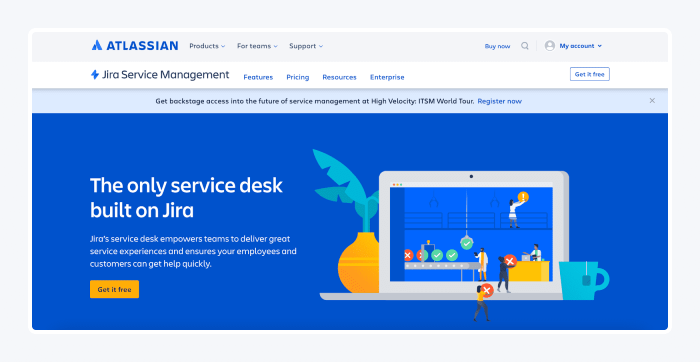
Ratings: 4.2/5⭐️(650+ reviews)
Jira is part of a bigger ecosystem that combines both customer service help desk and internal IT issue tracking solution. It enables agents to create unified views for multiple projects and request processing, which makes help desk management quicker and easier. Additionally, Jira templates for issues can streamline creating and managing tickets, ensuring consistency and clarity across the support teams. This is a perfect solution for enterprise-sized companies.
Pros:
- Request queues
- Customer self-service options
- Service Level Agreements (SLAs)
Cons:
- Menu navigation needs improvements
- Non-customizable reports
- Free version available
- Standard ($22.05/mo/agent)
- Premium ($49.35/mo/agent)
- Enterprise → contact sales team
Have a look into the platform:
11. Live Agent
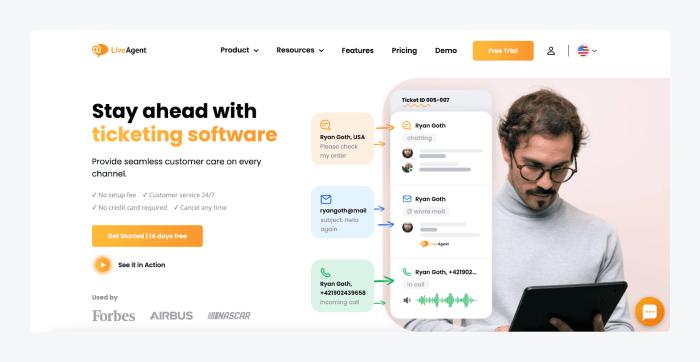
Ratings: 4.5/5⭐(1,450+ reviews)
Live Agent is a truly modern solution for small and medium businesses. Even though its main feature is live chat, it provides a plan with a help desk ticket system as well as call center functionalities. Its intuitive UI and many integrations are perfect for growing businesses.
Pros:
- Hybrid ticket stream
- Multichannel support
- Adaptable customer portal
Cons:
- Not as comprehensive as some of the competitors
- Limited options for interoperability
- Free plan available
- Small business ($9/mo/agent)
- Medium business ($29/mo/agent)
- Large business ($49/mo/agent)
- Enterprise ($69/mo/agent)
Have a look into the platform:
Read more: Learn how to add live chat to a website quickly and easily.
12. Jitbit
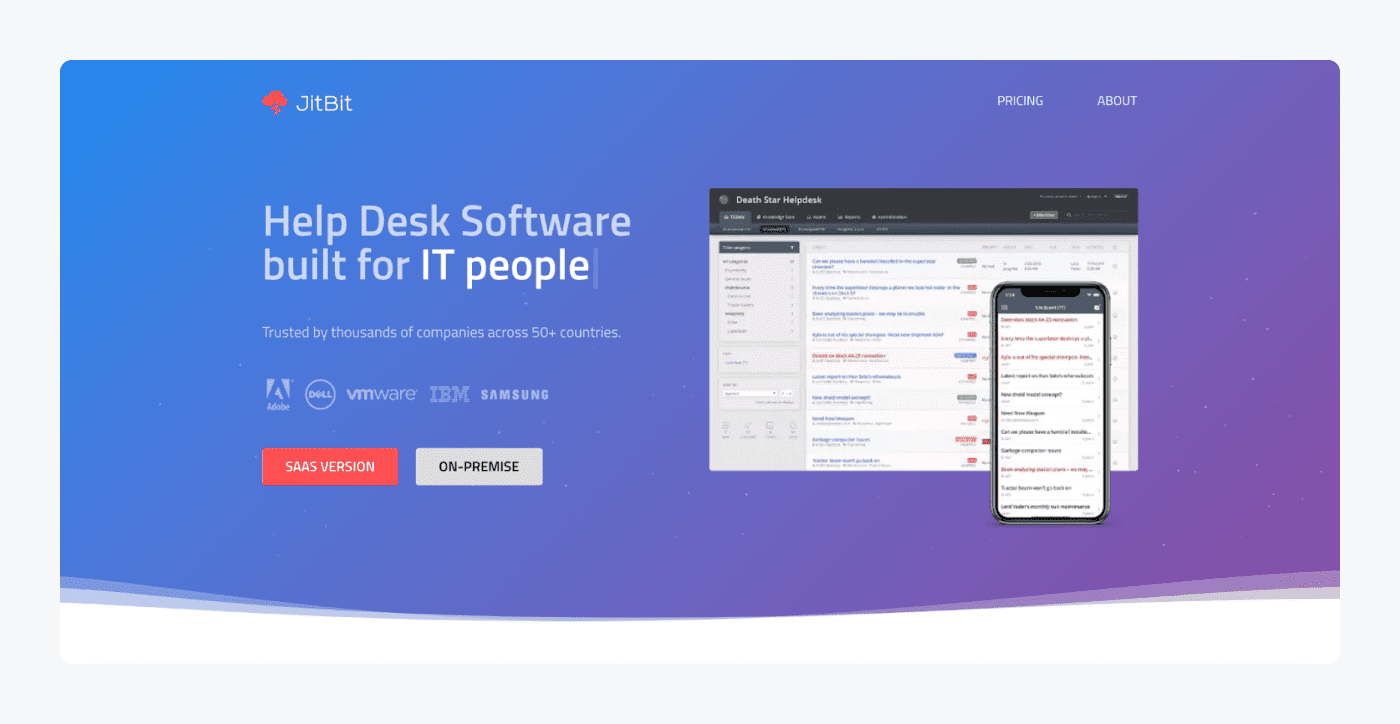
Ratings: 4.2/5⭐️(45+ reviews)
Jitbit’s a unified, IT ticketing system with a primary focus on email. It’s extremely easy to set up and lets you choose whether you want to use the cloud or on-premise version. On top of that, it provides a mobile version of its simple ticketing system, so you can always be up-to-date with your IT support team.
Pros:
- iOS and Android mobile apps
- 500+ integrations available
- Helpdesk automation
Cons:
- Email filtering needs improvements
- Some users say it can be slow and glitchy at times
- Free 21-day trial
- Freelancer ($29/mo)
- Startup ($69/mo)
- Company ($129/mo)
- Enterprise ($249/mo)
Have a look into the platform:
13. WordPress Advanced Ticketing System
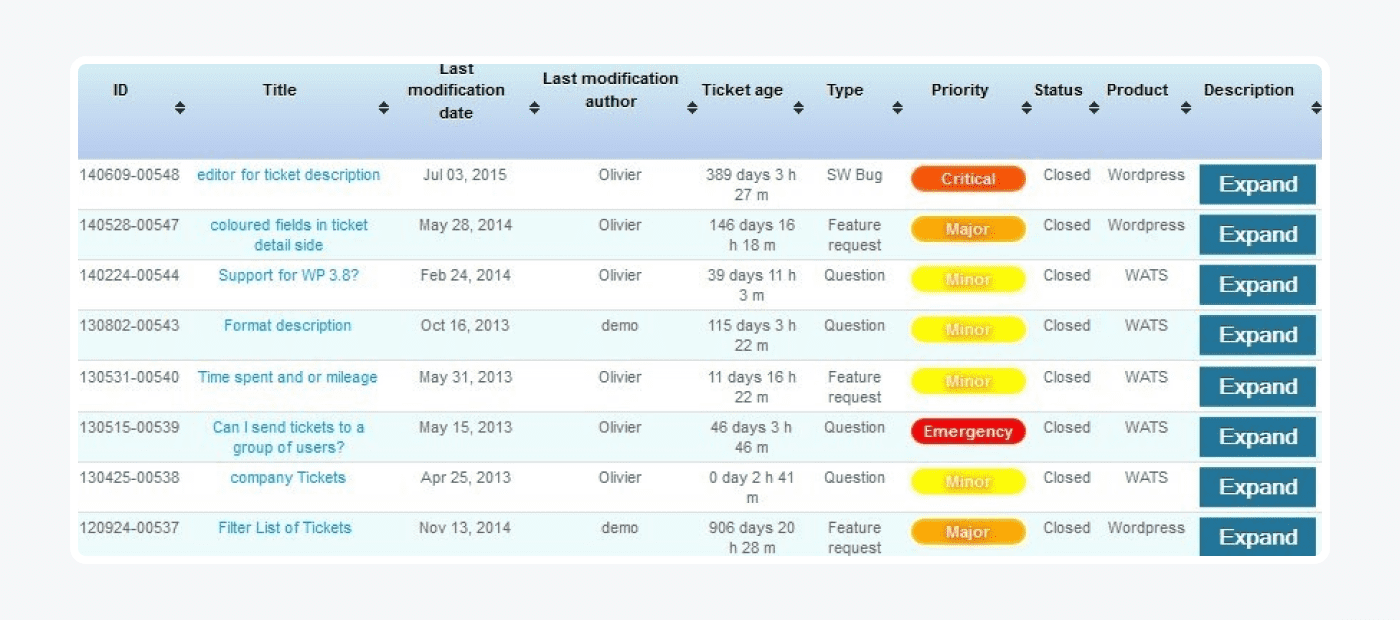
Ratings: 4/5⭐️ (55+ reviews)
This is a plugin-based ticketing system for small businesses. It will fit the needs of SMBs that handle simple customer service operations and don’t mind receiving tickets via email and web forms only. It’s extremely easy to integrate and use. Since it’s WP-dedicated, it won’t slow down your website. The only drawback is that it doesn’t support any other channels like live chat or social media.
Pros:
- Ticket tracking and statistics
- Email ticket transfer
- Custom ticket fields
Cons:
- A little outdated software
- Can be difficult to implement on the website
- Free, open-source help desk ticketing system for WP users
- WATS Premium ($50/license)
Read more: See the best free WordPress themes and discover more WordPress plugins for ecommerce.
14. KB Support
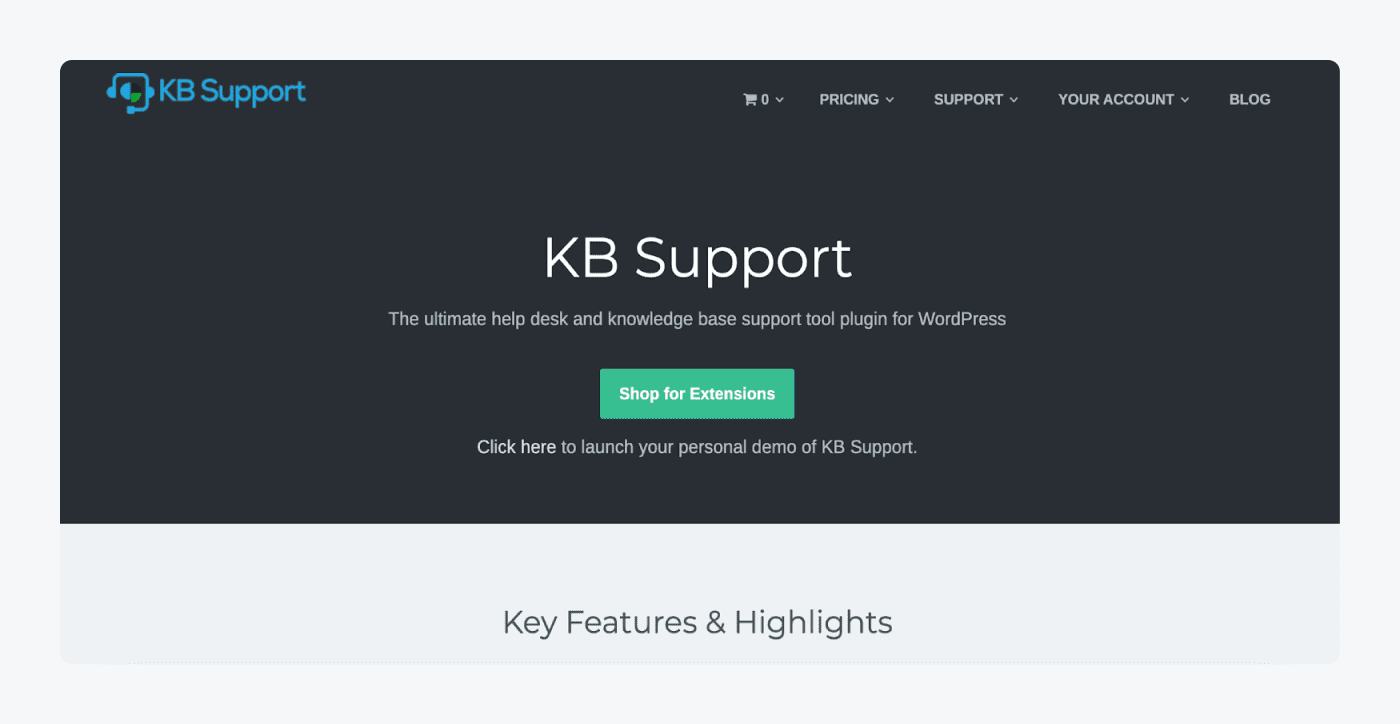
Ratings: 4.6/5⭐️ (20+ reviews)
KB Support is another online ticketing system dedicated mainly to WordPress. It’s as lightweight and user-friendly as its predecessor, but it has many more features that may come in handy for growing businesses. These include Zapier and WooCommerce integrations, canned responses, as well as customer support and knowledge base.
Pros:
- Zapier and WooCommerce integrations
- Self-service options
- Custom ticket statuses
Cons:
- Customer support needs improvements
- No update for PHP8
- Starter ($74/year)
- Professional ($102/year)
- Enterprise ($150/year)
Have a look into the platform:
Read more: Discover the best ecommerce integrations available on the market and learn how they work.
15. Vision Helpdesk
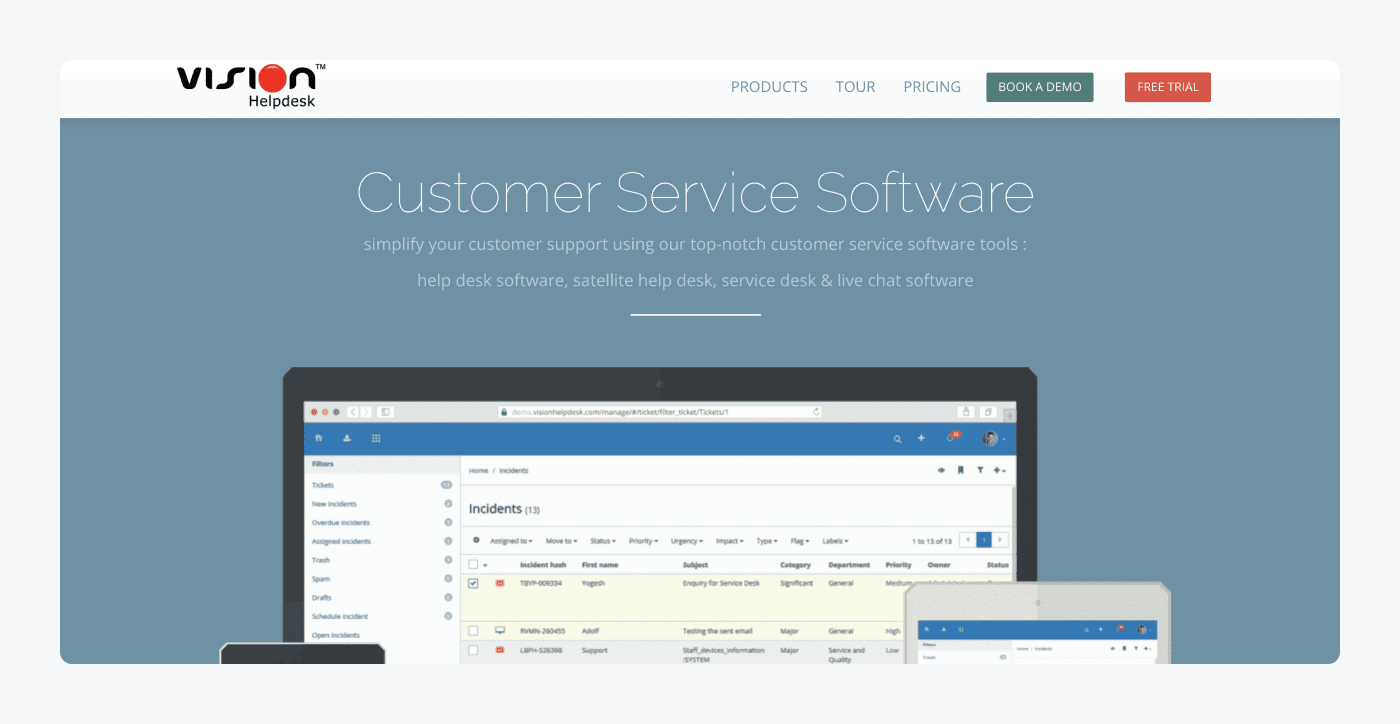
Ratings: 4.7/5⭐️ (85+ reviews)
This service desk ticketing system will come in handy for any type of business: from small to enterprise. It’s cloud-based and it offers a variety of features that help streamline all kinds of requests, from IT issues to standard customer escalations. Its main highlight is the gamification features for agents to help them stay motivated.
Pros:
- Agent achievements features
- Automated ticket management
- Multichannel support
Cons:
- Limited integrations
- Expensive branding removal
- Starter Help Desk ($12/mo)
- Pro Help Desk ($20/mo)
- Satellite Help Desk ($24/mo)
- Pro Service Desk ($32/mo)
- Enterprise Service Desk ($48/mo)
Have a look into the platform:
Read more: Learn the key differences between help desk vs. service desk platforms.
16. Front
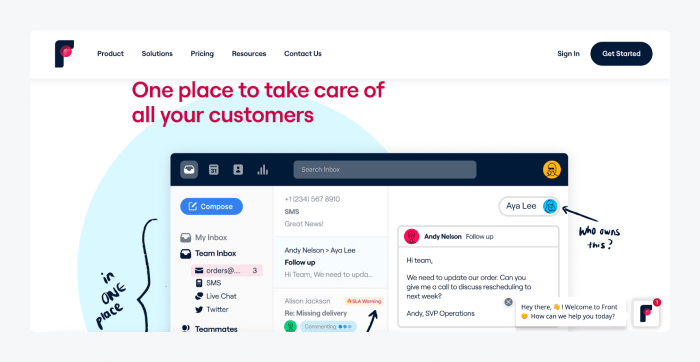
Ratings: 4.6/5⭐️ (1,910+ reviews)
This is one of the support ticketing systems that will strongly promote teamwork in your company. All agents can monitor the ticket’s progress as well as collaborate on the resolutions in the draft tools. On top of that, Front supports a variety of channels—from traditional SMS to social media and live chat.
Pros:
- Omnichannel support
- Shared draft tools for collaboration
- Ticket analytics
Cons:
- Duplicated emails in the inbox
- Limited customization of the system
- Starter ($19/mo/seat)
- Growth ($59/mo/seat)
- Scale ($99/mo/seat)
- Premier ($229/mo/seat)
Have a look into the platform:
17. AzureDesk
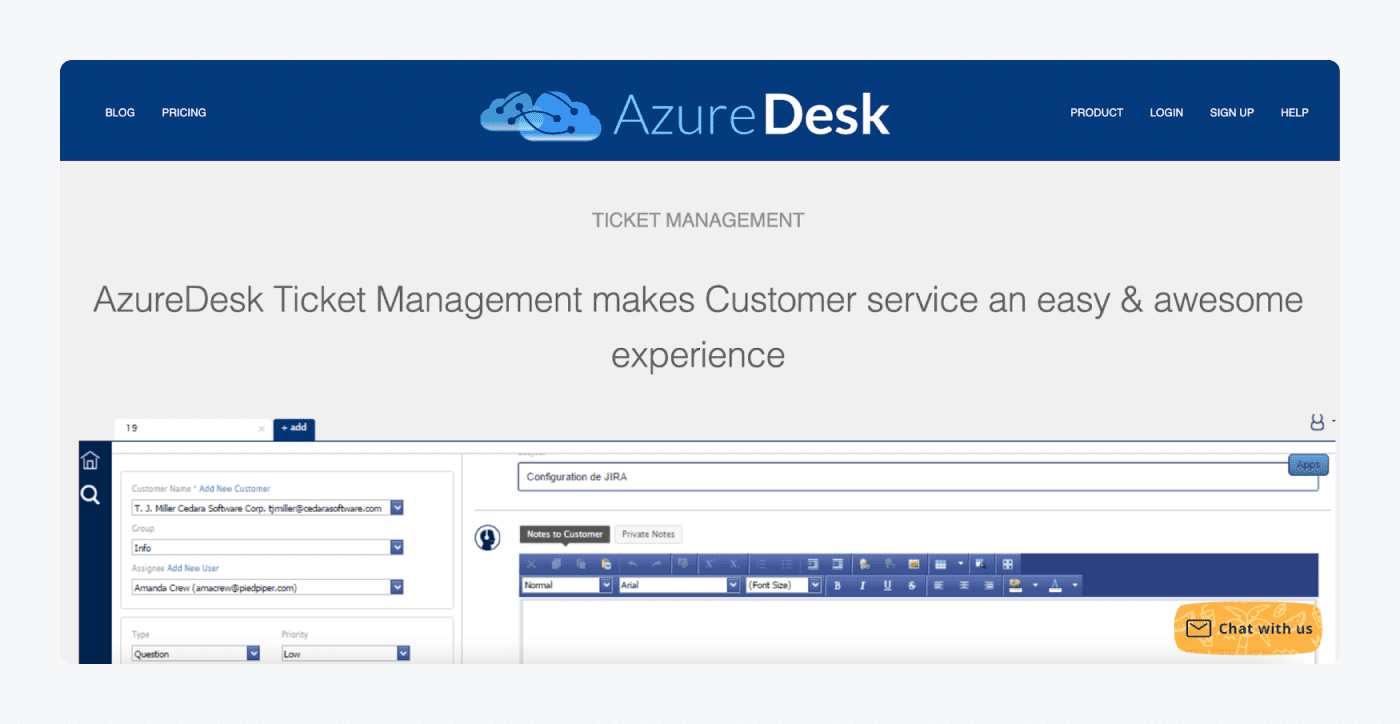
Ratings: 4.6/5⭐️ (10+ reviews)
AzureDesk is one of the most flexible options on our ticketing system software list. It allows you to use multiple email addresses and enables agents to convert emails into tickets. On top of that, it integrates with the most popular apps like Slack, Jira or Asana.
Pros:
- Unlimited email addresses
- Email to ticket conversion
- Agent signatures
Cons:
- Technical expertise needed for customization
- No priority list for the tickets
- Free 14-day trial
- Plus ($50/mo/user)
Have a look into the platform:
18. ProProfs Help Desk
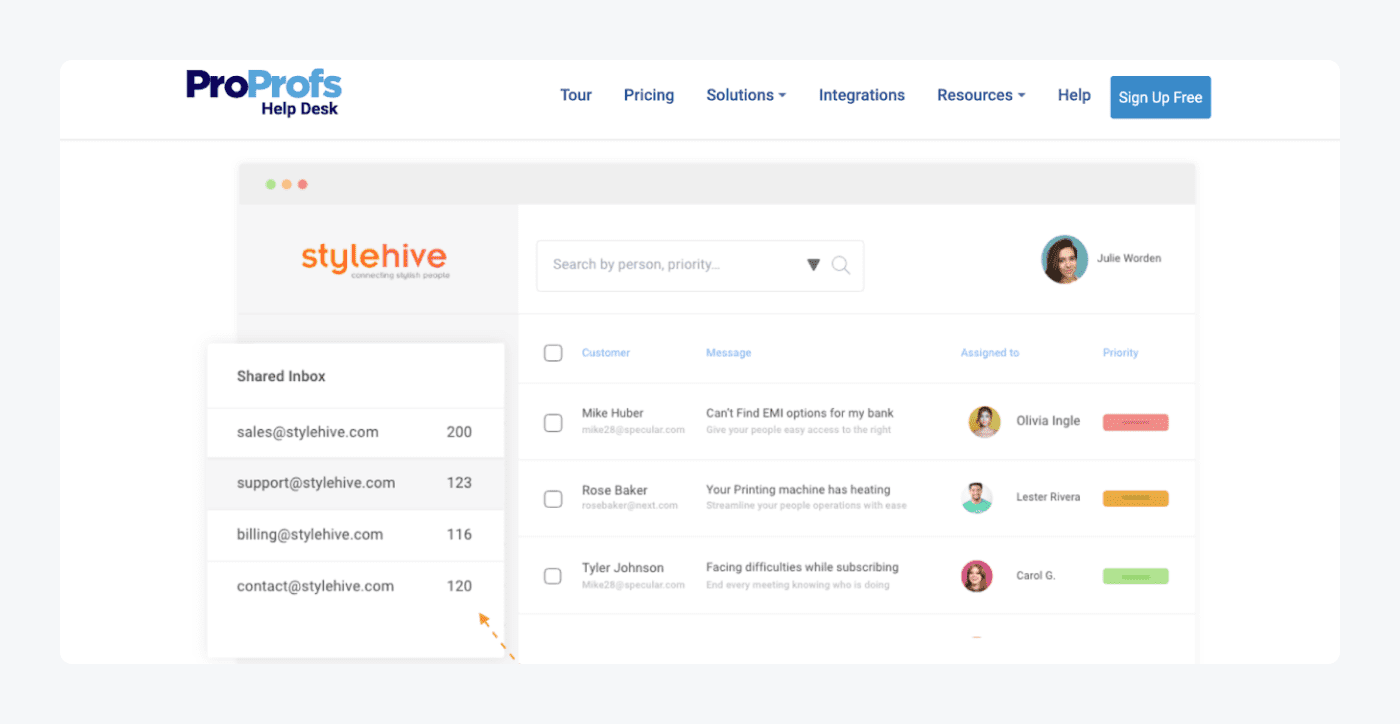
Ratings: 4.4/5⭐️ (30+ reviews)
ProProfs uses automation to evenly distribute the number of tickets among team members, which encourages collaboration and increases the sense of ownership. It’s rich in internal integrations, which makes it an all-around solution for companies that want to increase team productivity and enhance efficiency.
Pros:
- Automated and even ticket distribution
- Advanced productivity monitoring
- Ticket response tracking
Cons:
- Some users say the editing interface is a little cumbersome
- Downloading files is difficult and sometimes doesn’t work
- Free plan available
- Team ($29.99/mo/operator)
Have a look into the platform:
19. SupportBee
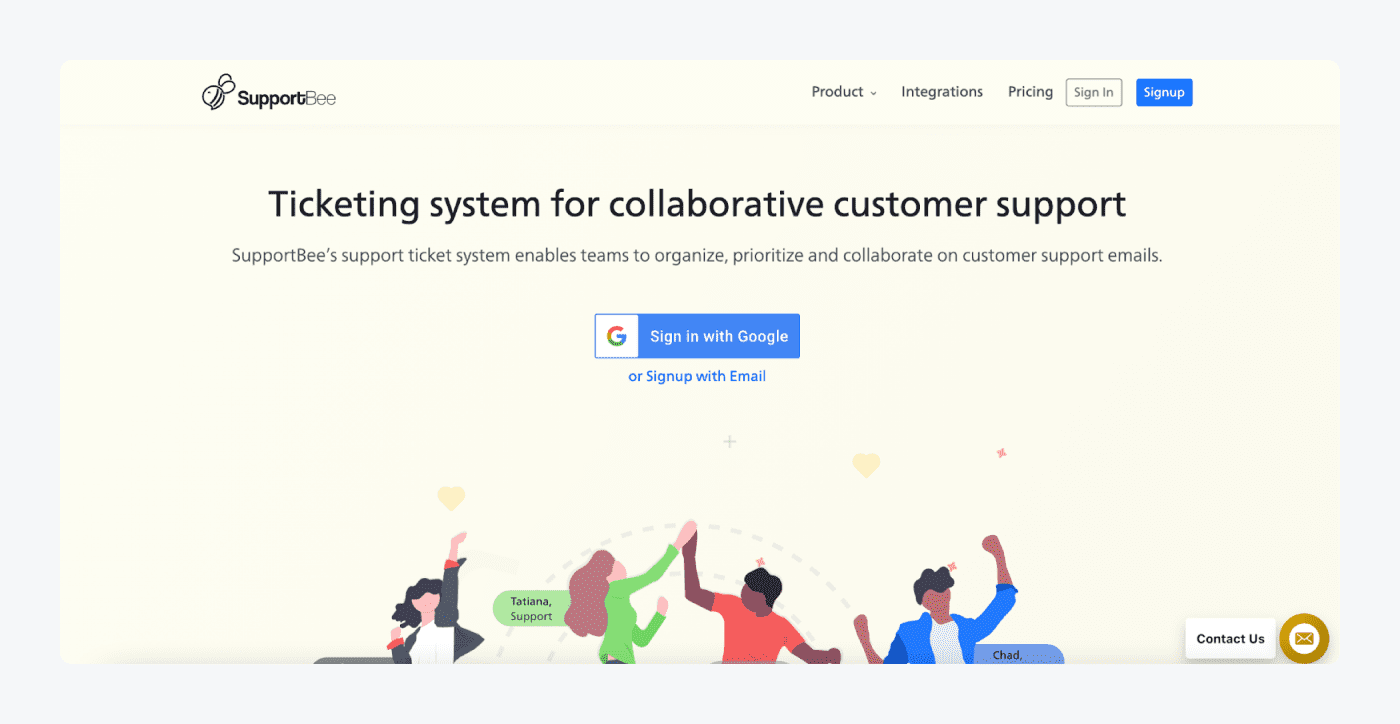
Ratings: 4.2/5⭐️ (5+ reviews)
SupportBee is an extremely lightweight and simple, which makes it perfect for micro and small businesses. It provides a set of basic, well-rounded features such as unlimited email inboxes, a shared inbox, and customer ratings.
Pros:
- Unlimited email inboxes
- Team messaging tools
- Multiple branding options
Cons:
- Limited organization tools for the knowledge base
- Some users report occasional performance issues
- Free 14-day trail
- Startup ($15/mo/user)
- Enterprise ($20/mo/user)
Have a look into the platform:
20. Kayako
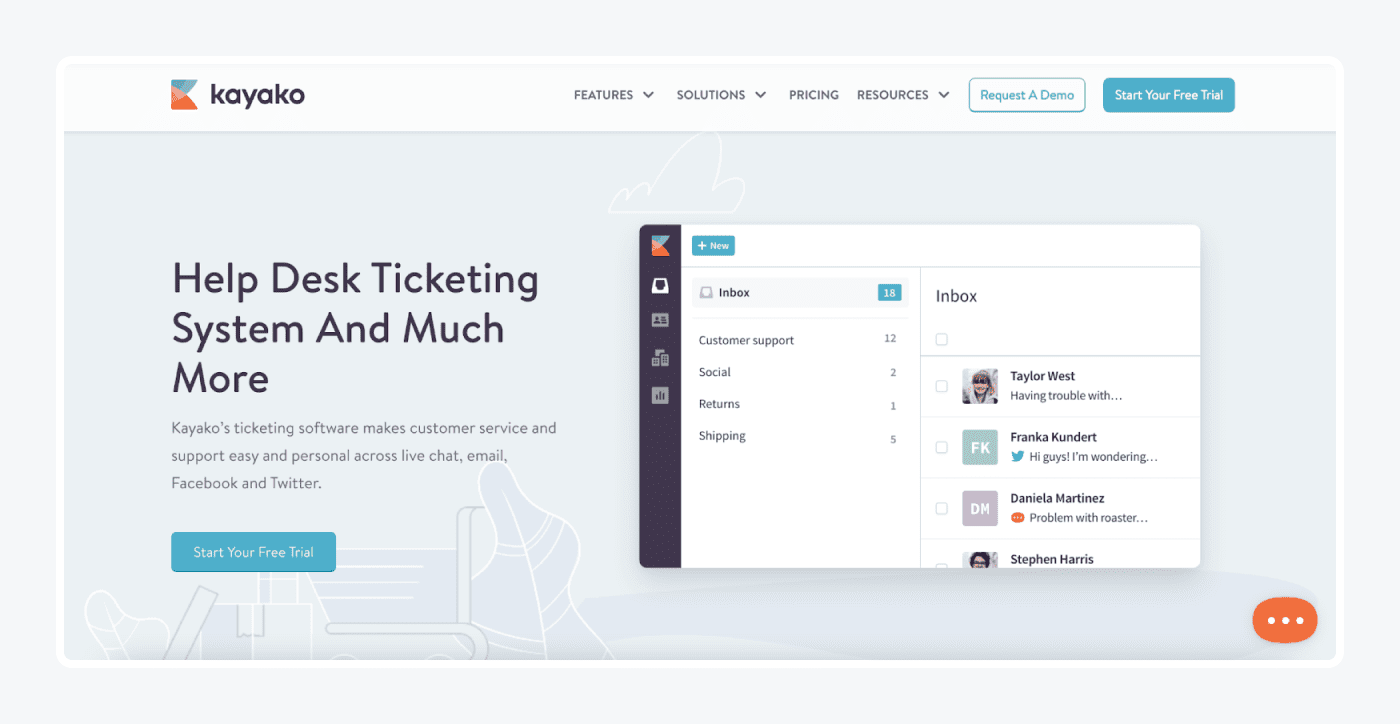
Ratings: 4.1/5⭐️ (200+ reviews)
Kayako’s multichannel ticketing system is simple and easy to use. Its unique feature is “Customer Journey Single View,” which enables your agents to map the context of the query based on all the information it collects about the customers.
Pros:
- Expert collaborators features
- Customer Journey Single View
- SLA notifications
Cons:
- Users say there are many bugs in the system
- Generating custom reports is difficult
- 14-day free trial
- Request a demo for pricing
Have a look into the platform:
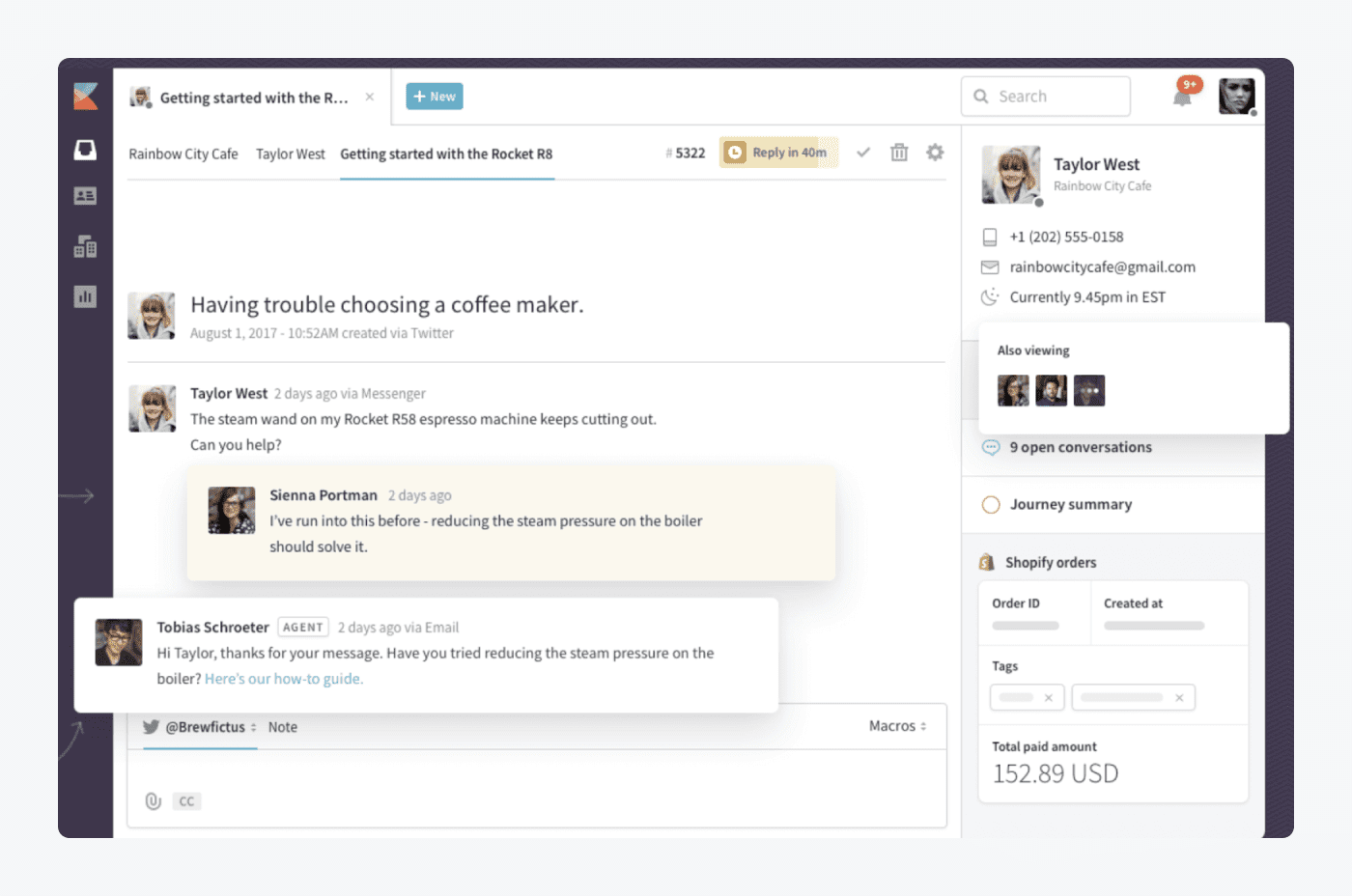
Now that you know the best platforms available out there, let’s check the features you should look out for.
Read more: Check out the best Kayako alternatives and explore their pros, cons, and pricing.
Must-have features of a ticketing system
To ensure your business offers the best customer experience possible, you need to equip your representatives with the essential ticketing features. These could include a self-service portal, a variety of message templates, and tools to measure ticket volumes. Once implemented, the software should help them handle the queries, collect customer data, and prioritize tickets. All of these actions will help to ensure high results on the help desk performance metrics.
Let’s have a look at essential features you should take into consideration when making your choice.
1. Ticket tagging, categorization, and routing
Centralized ticketing is the backbone of every ticketing system out there. But for businesses that want to make their customer service truly effective, this might not be enough.
If you want your agents to know the status of their cases, tagging, categorization, and routing are crucial. This will help the reps to have clarity of what needs to be done in order to resolve the questions right away.
Here’s how ticket categorization looks on Tidio’s interface:
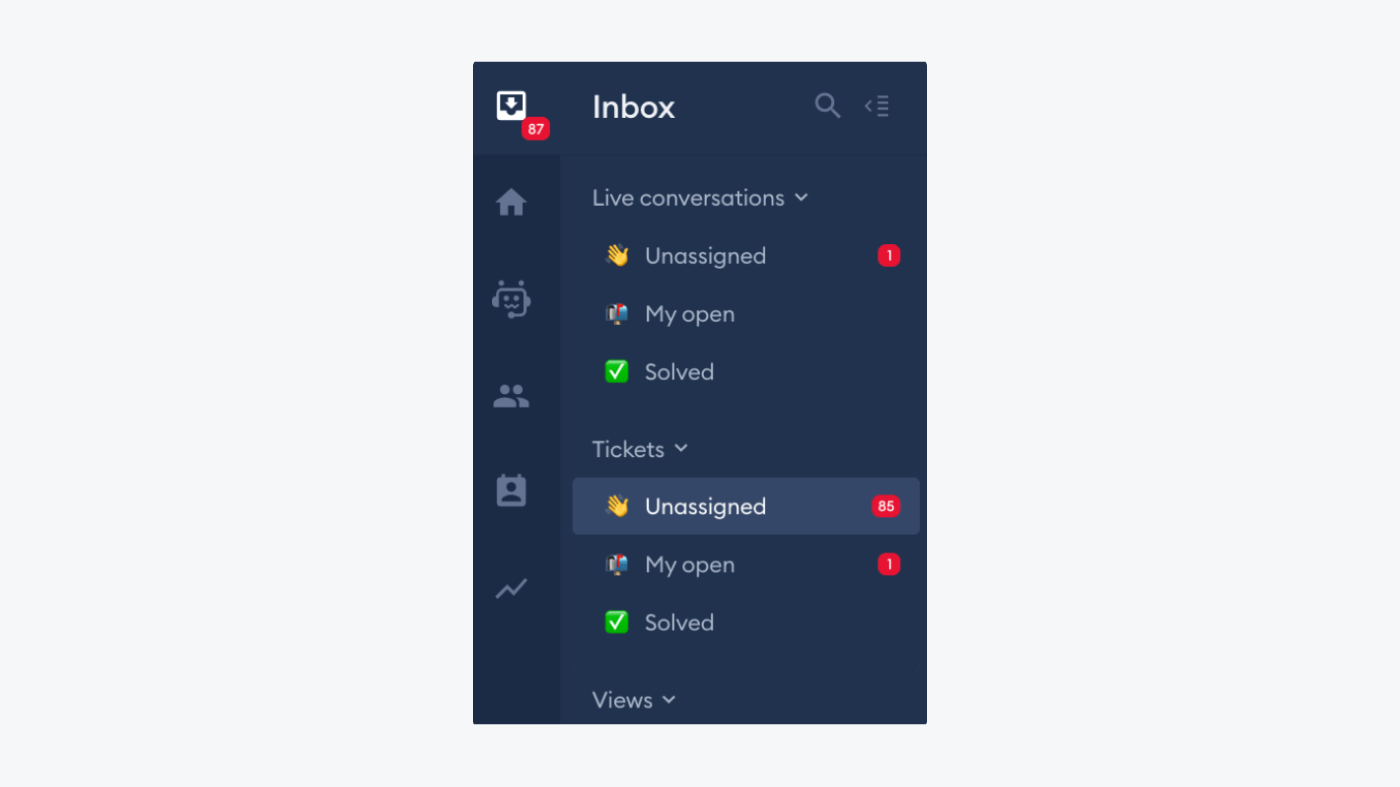
2. Multichannel support
Customers can reach out to you via a variety of channels, which may result in their messages being scattered around and result in a lack of personalized communication. To avoid this, make sure that your ticketing system supports all the channels that you use for resolving customer queries.
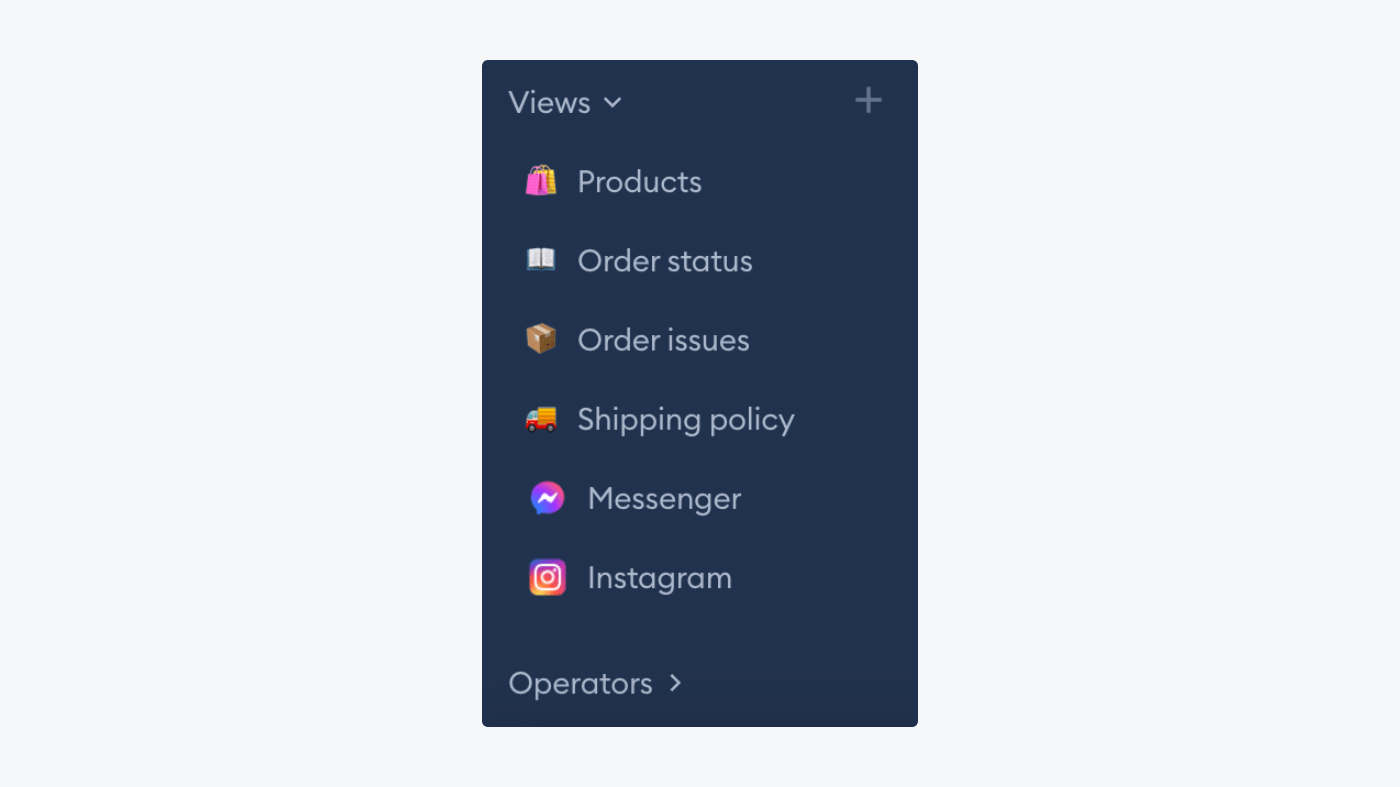
What if you are just starting? Statistically, the most used communication channels for consumers are chat (44%), Facebook (42%), WhatsApp (34%), SMS (32%), Email (28%), and Twitter (19%). It’s good to choose a solution that supports all of them.
Read more: Learn about WhatsApp chatbot and how to create it. Also, check out how Facebook chatbot works and top platforms you can use to implement it.
3. Integrations
The worst thing you can do is try to adapt your digital toolbox to the help desk and not the other way around. Introducing such a tool should make your life easier, not harder.
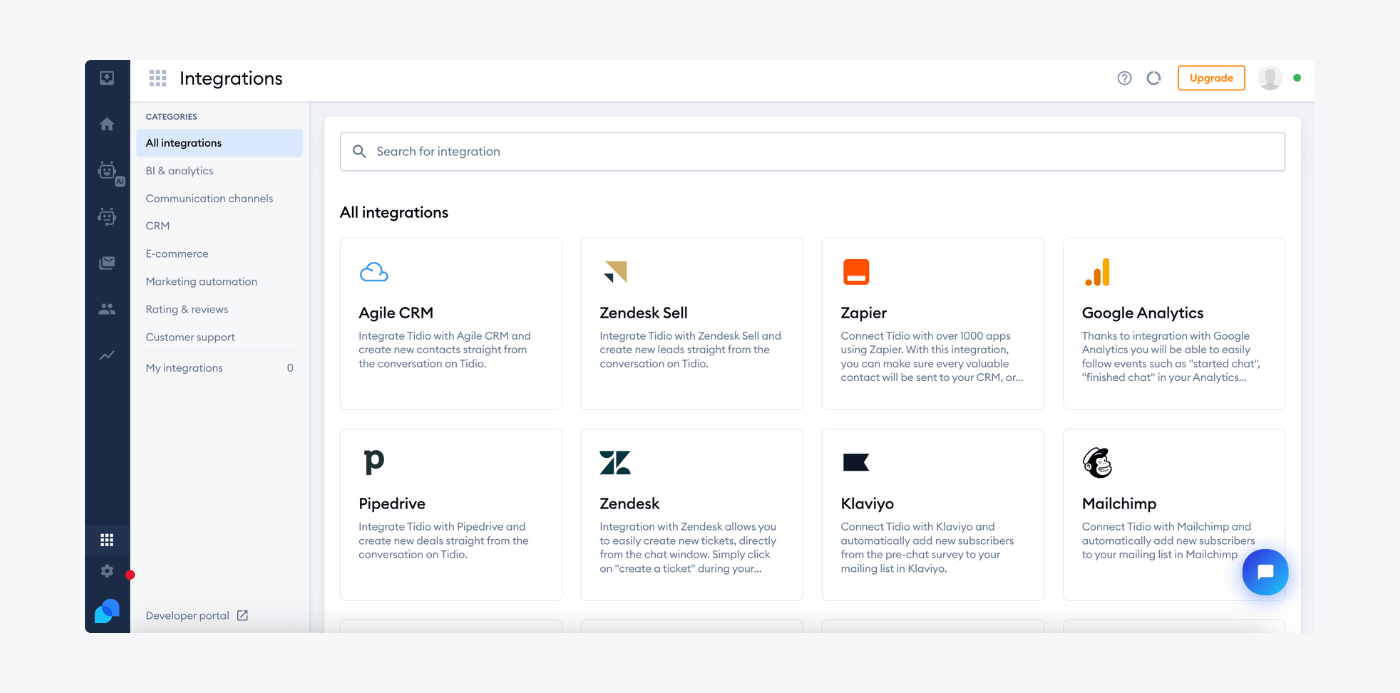
While choosing a support ticketing system, make sure it integrates with all tools that are essential for your business. This will help you avoid disjointed communication, multiple data sources, and confusing measurement methodology.
4. Automation
There’s no use in having a ticket system software if you can’t automate the most time-consuming, routine tasks like categorizing requests, assigning tickets, and escalating issues.
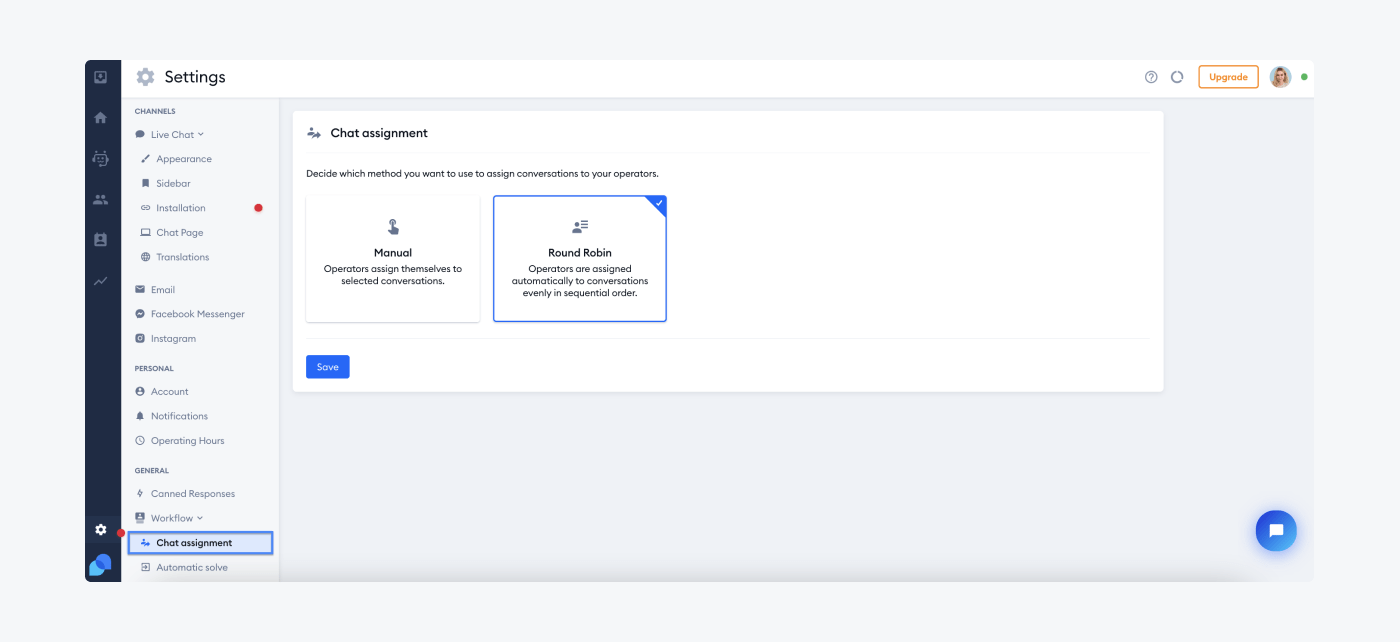
Automation makes ticket management easier and faster and reduces human error, too. In fact, HubSpot research has shown that 86% of customer service teams have noted an increase in productivity after they started using ticketing software.
5. Data tracking and analytics
Performance and measurement go hand in hand. Helpdesk ticketing system analytics will enable you to generate reports on specific metrics that you want to improve and see where the areas for potential improvements are. Even small businesses will benefit from tracking resolution time and the helpfulness of their customer support teams.
Get Tidio and enjoy all the robust ticketing system features
And what are some of the advantages you could expect from implementing a software for ticketing system? Here are the main benefits.
Benefits of a help desk ticketing system
Ticket management systems receive, organize, and distribute tickets in order to resolve a customer’s issue in the most efficient manner. Easy, right?
But what if we told you that easier work management is not the only benefit of using ticketing systems?
The top benefits of a ticket management system are:
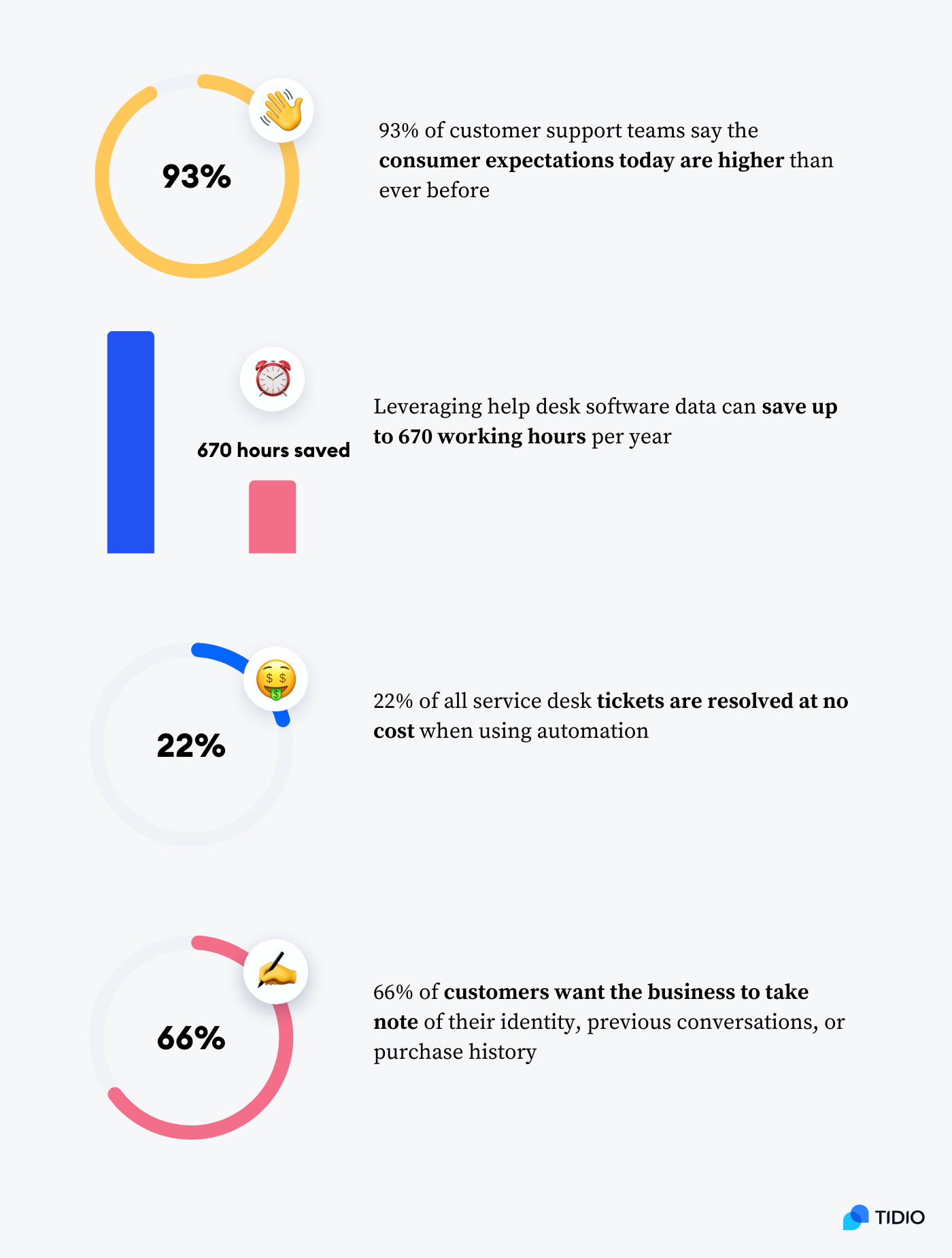
1. Increased productivity
As many as 93% of customer support teams say that the expectations of consumers today are higher than ever. Customers want answers in minutes, not hours or days, so it’s only logical that the shorter the response time, the better.
By using a helpdesk ticketing system, you unburden your customer support team. Think about it—categorizing, assigning, and reassigning issues, searching for information, and escalations are all time-consuming tasks.
When you install software that takes care of all these, your agents can focus on what truly matters.
Read more: Find out why customer service is important for your business.
2. Saved time and reduced costs
A study has proven that leveraging help desk software data can save up to 670 working hours per year.
Moreover, the cost of manually handling a single help desk ticket is $22. However, when you use automation, 22% of all service desk tickets are resolved at practically no cost.
Conclusion?
Help desk ticketing systems can save you time and money in the long run.
Read more: Discover how Shockbyte used Tidio to slash their average response time and increase customer satisfaction.
3. A fundament for internal and external knowledge bases
Customer support ticketing systems can also help you identify common issues, which, consequently, can indicate improvement areas for your customer service teams.
You can address this by creating knowledge base articles and delivering customer service training. Through this, you improve the performance of your teams and expand self-service options for your customers.
4. A goldmine of insights
Are your customers happy with the service they get? How do your CS team members deal with specific issues, and what is their resolution rate? A customer support ticketing system will tell you the truth.
By tracking the ticket data and organizing them in neat silos, you can measure your team’s productivity, stay up-to-date with customer satisfaction metrics, and even predict the customer’s lifecycle.
Read more: Discover the crucial customer success metrics to measure your results more effectively.
5. Improved customer relationships
A whopping 66% of consumers say that it is important for businesses to take note of their identity, previous conversations (56%), and purchase history (55%).
With a ticketing system, a customer doesn’t have to repeat themselves many times, because all interactions are recorded in the ticket. As a result, any conversation can restart where it ended, even when an agent changes. This builds trust among your customer base.
Now that you’re familiar with the benefits and main features, let’s jump into the best practices when using a support ticket system.
Ticketing software: best practices
Your support agents should have all the tools necessary to do their job in the best way possible. This way, clients will ask your IT team for help instead of seeking support in forums.
So, here are some tips and best practices for making the most out of a ticketing system software:
- Train your agents
Create a training program for your representatives to show them how to use the platform to its fullest. Depending on what platform you go for, some providers offer this type of training as part of the onboarding.
- Create more sales opportunities
By connecting the ticketing system with the marketing tools, your agents can identify opportunities for an upsell or cross-sell of your products easier. You can also use automation that will stop people from abandoning their carts, offer discounts for bundled products, and more.
- Collect customer feedback
Once your agents resolve the ticket, they should ask for client feedback. This way, you’ll be able to measure customer satisfaction, Net Promoter Score, resolution rate, and more metrics that show the quality of your service.
So, how to implement this system into your website?
Let’s find out.
How to create a help desk ticketing system?
Once you choose your platform, it’s time to implement it. We’ll be using Tidio as an example as the tool is easy to use, and adding it to your site takes only a few minutes.
First, you need to connect your mailbox to the platform. Go to Settings and click on the Ticketing section in your admin panel. Choose the Connect your email button.
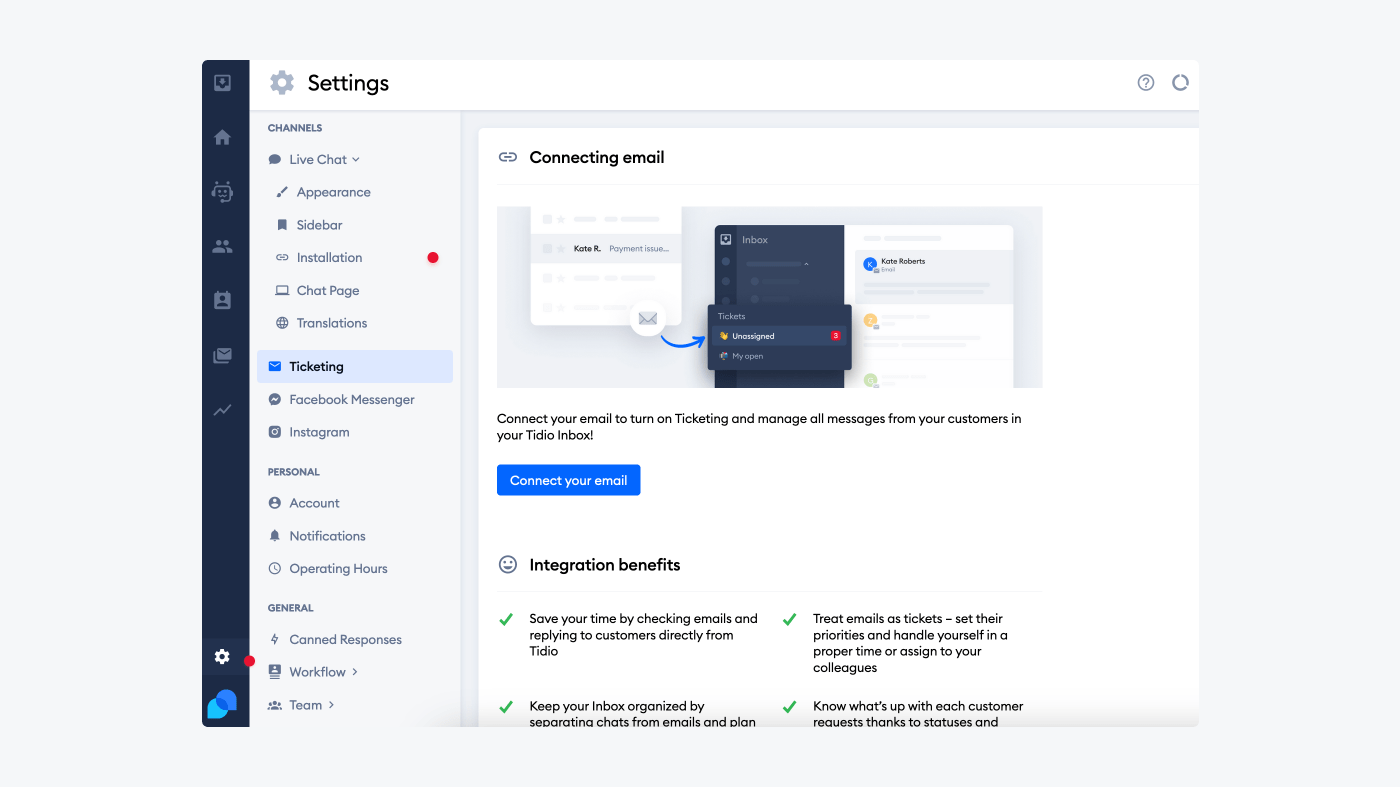
Once connected, you’ll be able to see all the arriving tickets in the Tickets section in Tidio’s panel. All the new tickets will be in the Unassigned folder.
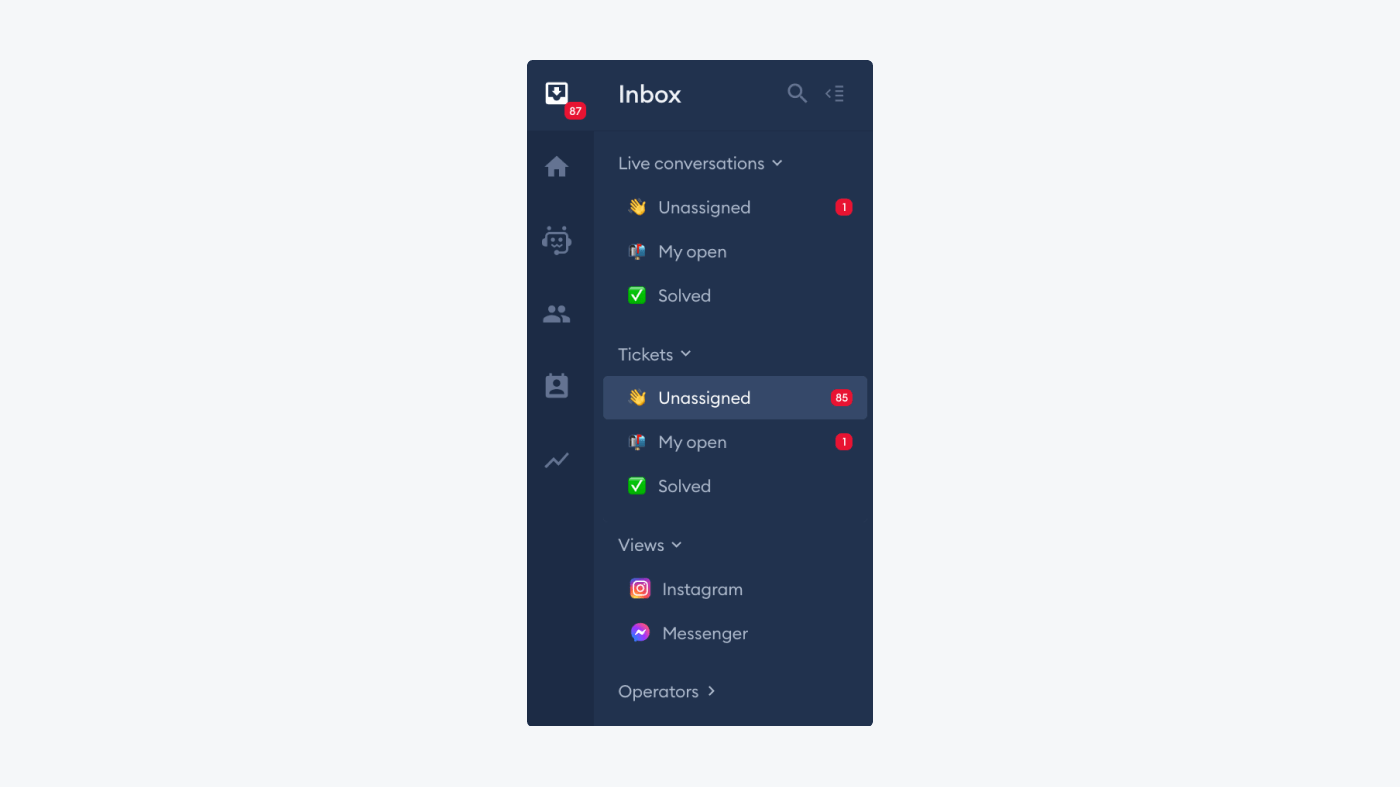
To assign the tickets, click on the chosen one to open it. On the right-hand side, you’ll see the status, priority, and assignee. You can change these based on the information within the message.
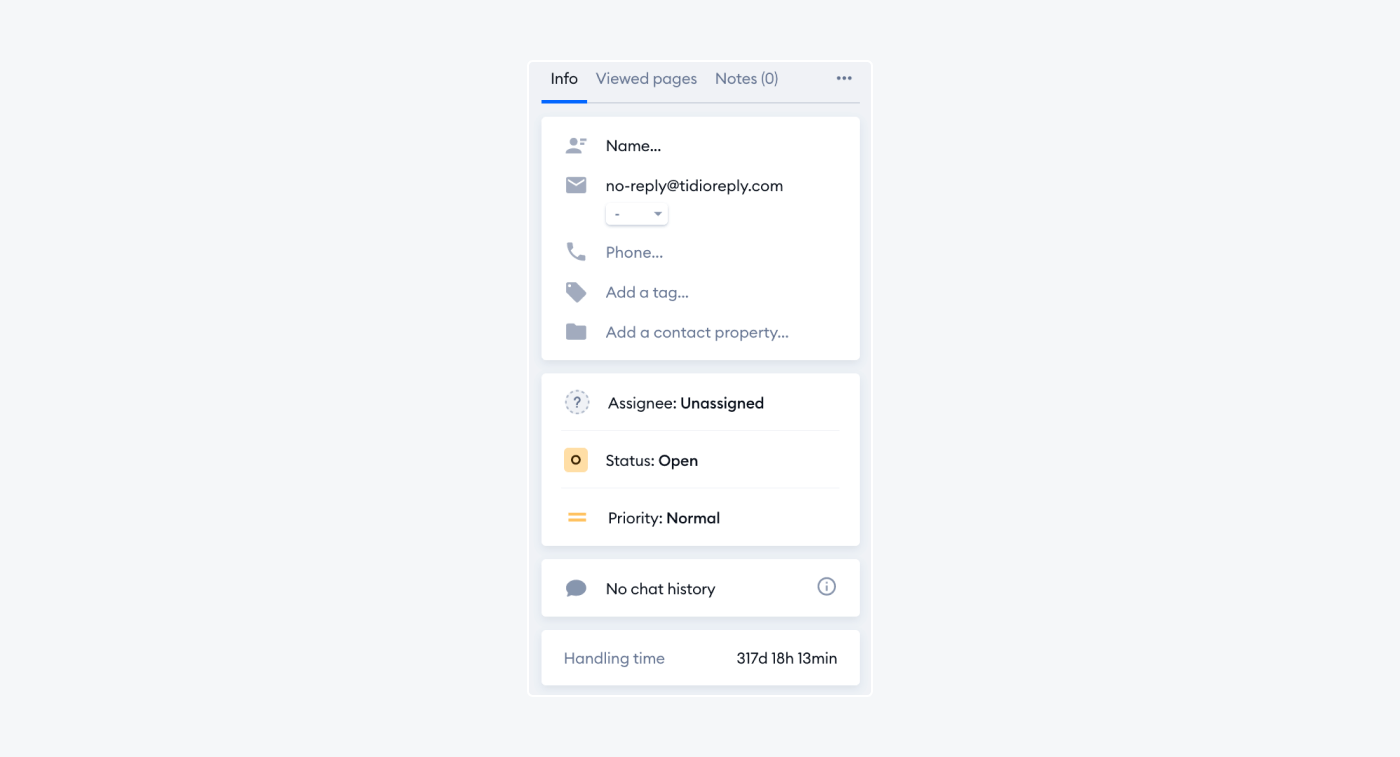
There are also options to add an internal note and make the ticket visible only to the agent handling the ticket. You can find these under the typing window.
To create a ticket, click on the Create a ticket button in the left-hand side menu of your Inbox panel. Inside it, you should:
- Specify the ticket subject
- Write a short summary of the ticket content
- Add customer email address
- Define the priority of the ticket
- Add the assignee responsible for the ticket
- Determine the ticket status
Read more: Check out the full guide on how to use Tidio ticketing system.
Streamline help desk operations using a ticketing system
A ticketing system is a great IT asset for your company. On top of answering, prioritizing, and organizing the queries, you can also automate some of the processes. Here’s how.
You can use an automatic chat assignment to streamline some of the processes. When you enable Round-Robin, the system will automatically assign new conversations to active operators, one by one. For example, if there are three operators on duty, the distribution will follow in this manner:
- First chat gets assigned to operator 1
- Second chat gets assigned to operator 2
- Third chat gets assigned to operator 3
- Fourth chat gets assigned to operator 1
- And so on
Another automation you can use are automatic responses. You can automatically answer each incoming ticket with a pre-written message.
To do that:
- Go to Settings and click on the Ticketing section
- Choose Automatic Response
- Enable the toggle and set the message below it
- Save the changes
Since you know how to create your ticketing system and use it to automate the repetitive tasks, let’s have a look at what software your business should use for best results.
How to choose the right ticketing software for your business
Different companies will have different needs, so you need to make sure the software you plan to use meets your specific requirements. Here are some things to consider based on the type of business you have.
Nano/freelancer
These businesses need a free or non-expensive ticketing platform with basic functionality. As you probably don’t have many inquiries coming through yet, you don’t need robust enterprise-level features. Instead, choose software that offers features for sorting tickets, looking up customer information, and managing clients on the go using an app. In that case, you should pick a platform such as Freshdesk.
SMBs
If you have a small to medium-sized business, your tickets are growing and you need help with managing them. Your support team will find automation, shared inbox, tracking functionality, and analytics dashboards useful. You should pick a platform like Tidio that offers a ticketing system, automation, and email marketing software in one.
Large/enterprise-level businesses
Large businesses will benefit from a personalized solution with a dedicated success manager to ensure the ticketing software integrates and works seamlessly with the entire system. You need to look for a provider that offers scalable tools that will boost the efficiency of your support team and automate mundane tasks. Your business should use a platform like Zendesk that has enterprise-level features and functionality.
Help desk ticketing system: summary
That’s it! Here’s the full list of the best ticketing systems we reviewed:
- Tidio
- Zendesk
- HubSpot
- Zoho Desk
- Mojo IT
- Freshdesk
- HappyFox
- osTicket
- HelpScout
- Jira
- Live Agent
- JitBit
- WordPress helpdesk plugin
- KB support
- Vision
- Front
- Azure Desk
- ProProfs
- SupportBee
- Kayako
By now, you should have at least a few favorites to choose from. Here’s what you need to remember when making the final decision:
- An online helpdesk ticketing system can increase the productivity of your team, save you time and money, as well as identify areas of improvement.
- The best help desk ticketing software is the one that will fit your business needs.
- To choose the best help desk for your company, set expectations for: ticket tagging, categorization and routing, multichannel support, integrations, automation, and data analytics.
And if you have any doubts and need support—feel free to contact us anytime.
Enjoy the process of testing!
